#it's an interpretation that's stuck with me since i read the divine comedy for a class
Text
Fate Fanservant: Judas Iscariot, The Traitorous Disciple(Avenger)
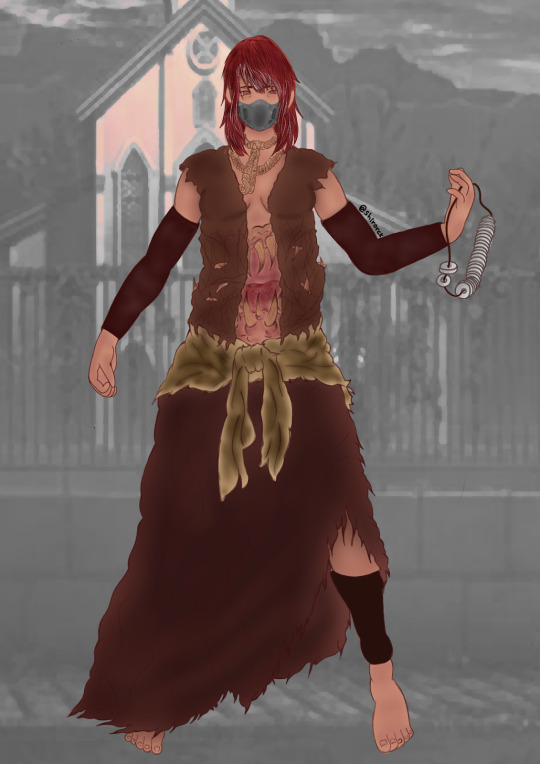
Ascension Stages:
First Stage: Judas is clad in tattered clothes, an a large red scar is cut across her stomach, in the shape of a demonic toothy maw. A mask covers her mouth, and her hair is blood-red with white streaks. She is hunched over, with a hangman’s noose around her neck, and a string of silver coins wrapped around her hand.
Second Stage: Judas’s robes have become even more torn and ratted, and the markings on her stomach have shifted and morphed, revealing a massive, demonic mouth lined with rows of teeth and dripping blood.
Final Stage: Judas is now clad in more kept-together cloth, covering the mouth on her stomach. The pieces of silver hang around her neck, and she stands up much straighter. She has a small smile on her face.
Theme:
SCORN RAP by JT Music - "Sick of Myself"
Hell's Comin' with Me
Traits:
Class: Avenger
Alternate Class: Assassin, Caster, Ruler, Alter Ego, Beast
True Name: Judas Iscariot
Source: The Bible
Region: Israel
Alignment: Lawful Evil
Attribute: Star
Known as: Yehûdâh Ish-Kerayot, The Traitor, The Liar, The Woman from Kerioth, The Thirteenth Disciple, The Woman of Pollution, the Thirteenth Seat
Voice Actress: Asakawa Yuu
Deck: QAAAB
Parameters:
Strength: C-
Endurance: A+++
Agility: B
Mana: A+
Luck: E-
NP: EX
Passive Skills:
Magic Resistance EX:
As one of the original Thirteen Disciples, Judas Iscariot’s Magic Resistance is at the highest rank, on par with that of Saints. It is nigh-impossible for Magecraft to seriously affect Judas, even those from the Age of Gods.
Even for a fallen prophet, the psalms song still ring true in her heart of hearts:
“Even though I walk through the valley of the shadow of death, I will fear no evil, for You are with me.”
(FGO Effect:)-Increases own Debuff Resistance by 25%.
Avenger A+:
Judas Iscariot is defined by hatred and resentment. In the New Testament, the Thirteenth Disciple was known as a callous misanthrope, always willing to accuse others of heresy and wickedness, even when the prophet from Kerioth performed the same sinful acts she shunned others for. So great was her hatred that it is said that the Devil was able to enter her heart, influencing her to betray the person she believed in more than anything.
In return, upon her treacherous actions and death, Judas Iscariot became one of the most despised figures within the biblical canon, seen by many as the incarnation of betrayal itself. Those who wrote of the Twelve Disciples have all remembered Judas as the Traitor, the Betrayer, and the Sinful One. The very name of Judas Iscariot has become synonymous with evil and treachery.
Hatred of others and hatred unto oneself. Perhaps more than any other Servant, Judas Iscariot embodies the defining attribute of the Avenger Class.
(FGO Effect:)-Increases own NP generation rate when taking damage by 22%.-Reduces party's (including sub members) debuff resistance by 12% except themselves. [Demerit]
Oblivion Correction C:
As a penitent, Judas Iscariot cannot and will not forget the reason for her self-inflicted damnation. The betrayal of the one man who showed her such unconditional love. The kiss that betrayed Him to his enemies. The failure to redeem herself of her sins. Her hatred will never subside, even in death. Where so many found their salvation from their sins, she alone remained behind, unwilling to accept her Teacher's hand. She has chosen the path of her own Hell, alone, painful, and cold. And yet, it is one she will never waver from.
"O Lord... May you never forgive me for my sins... And may I never forgive myself for my treachery..."
(FGO Effect:)-Increases own critical damage by 6%.
Self-Replenishment(Magic) A:
As a Servant of God and embodiment of the Gates of Hell, Judas Iscariot's magical power is near-limitless. Her rage is unyielding, pushing her through even the most horrific types of pain without even flinching. It doesn't matter how badly or how many times her body is broken. It doesn't matter what kind of opponent she stands against. The answer is always the same: an unyielding march forward, until all who stand in her path are left to face the consequences of their actions.
It is the memory of her treachery that drives her, the fuels her every waking moment. Her sins call out to her each and every day, haunting her, screaming at her. Blood must be repaid with blood. Pain must be repaid with pain. Grief must be met with grief.
So long as the hatred pulses through her veins, the lashing, the torment, the sorrow, it will all drive her forward.
(FGO Effect:)-Charges own NP gauge by 4% every turn.
Pieces of Silver EX:
According to scripture, the price Judas Iscariot received for selling out Jesus of Nazareth to the chief priests was thirty pieces of silver. Upon realizing what she had done by betraying her teacher and friend, she attempted to return the pieces of silver to save him, only to be coldly rebuffed, with the priests scolding her for daring to bring blood money to the temple. Ultimately, these very same silver coins were used to pay for Akeldama, the Field of Blood where she hung herself in despair over her greatest sins.
Even in death, these damned coins follow Judas, strung around her neck as a reminder of her gravest sin. Each coin holds incredible amounts of magical power, and they can be offered up in order to boost Judas's own power, at the cost of the demon within gaining more influence over her. If she offers all thirty at once, she can activate her personal Noble Phantasm, Akeldama, the very same field that she bought with these thirty pieces of silver.
"I hear them... Always. Their clattering reminds me of what I've done... And why I can never accept forgiveness..."
(FGO Effect:)
-Whenever Judas Iscariot attacks, apply 'Pieces of Silver' buff to self, one time per turn(Can stack with other 'Pieces of Silver' buffs).
'Pieces of Silver' Buff:
-Gain crit stars equal to half the amount of ‘Pieces of Silver’ buffs
-At 30 Pieces of Silver, fill NP Gauge to 300%, and boost NP Damage by 30%.
-After NP is used, clear all 'Pieces of Silver' buffs[Demerit].
Active Skills:
Damned for All Time B:
For her role in the death of the Messiah, for her treachery and sin, Judas Iscariot is believed by many to have been subject to eternal damnation, cast within the deepest pits of Hell for eternal torment. Judas herself believes very much the same. Believing herself to be irredeemable, she willingly accepts any and all punishment given to her without complaint, fully awaiting her return to Hell.
However, thanks to the blessings imparted as a Disciple of Jesus, the Thirteenth Disciple recovers quickly from any and all enemy attacks, shrugging off grievous injuries such as limbs being removed, bones being broken, and even her heart being crushed. As a result, her body goes through a constant vicious cycle of being reborn, put back together, and being destroyed once more.
Judas herself claims that this is further proof of how God despises her, refusing to let her die to punish her for her wickedness and faults. A sign that she can never be redeemed or forgiven, and will suffer until the end of time for her evil actions.
And yet... Can this really be the truth?
(FGO Effect:)
-500% Chance to draw attention of all enemies to self by 300% for three turns.
-Recover 1500 HP at the end of each turn for three turns.
Protection of the Faith EX:
While infamous as 'The Traitorous Disciple', Judas Iscariot has among the highest levels of Protection of the Faith. Unlike many prophets, zealots, saints, and kings who praised their gods from a distance, Judas walked alongside her Messiah day to day. From the day she was cured of her own illnesses, she walked with him, broke bread with him, and preached alongside him. She knew of his dreams and aspirations, as well as his faults and imperfections. She loved and was loved in equal measure.
Even now, in her state of agony and pain, her thoughts are always centered around the man she called Teacher and Friend. While Judas Iscariot does not believe that she can ever be forgiven for her sins, nor does she believe she will ever reach the Heaven that was promised to her all those years ago, she still holds faith in the power and goodness of the King of Men. As a Servant, Judas uses the holy knowledge she was imparted, even when she proclaims herself a vile sinner, all because of the faith she keeps.
More than any Disciple, more than any follower, more than any person who ever lived, Judas Iscariot believed in her Messiah.
(FGO Effect:)
-Increases own debuff resistance for three turns.
-Recovers own HP.
-Increases own defense for one turn.
-Increases own attack for three turns.
-Apply Guts to self, two times, five turns.
Kiss of Judas A:
It is said that the thirteenth disciple betrayed her Master with a single kiss upon His cheek, signaling to the crowd that came to arrest Him. It is this single act that damned Judas Iscariot for all eternity, fully cementing her as the traitor to God and setting in motion the events of the Crucifixion as well as Judas's own death by hanging.
This moment manifests as a powerful ability, allowing Judas to gain every last fragment of knowledge of an enemy once she kisses them, seeing everything they've done, everything they've seen, and everything they will be. In a Holy Grail War, this ability is especially powerful, granting Judas knowledge to be used against enemy Servants. If used against a divine figure such as a god or demigod, this ability is even more powerful, cursing anything divine and holy with her very existence.
"Judas, are you betraying the Son of Man with a kiss?"
(FGO Effect:)
-Lower one enemy's defense for three turns.
-Decrease one enemy's charge.
-Increase own NP Gauge by 30%.
-500% Chance to draw attention of all allies to one enemy by 300% for three turns[Demerit].
-If used against a ‘Heaven’ Enemy:
--Remove all Buffs(activates first).
--Decrease one enemy's charge.
--Increase own NP Gauge by 30%.
--Inflict Curse on an enemy for five turns.
--Inflict Evil Curse on an enemy for five turns.
--Increase damage against 'Divine' enemies for all allies(five turns).
Noble Phantasms:
Noble Phantasm: Judas Iscariot - It Would Have Been Better If I Was Never Born
Rank: A+
Maximum Targets: 1
Range: 10m
Classification: Anti-Unit(Self)
The very noose the twelfth Disciple hung herself with on that fateful day. This symbol of her eternal shame manifests as a snapped noose tied around her neck. This rope is taut as ever, but even though its rope seems severed, it can extend to impossible lengths to reach whatever target she aims for. Judas can use this noose as a grapple, allowing her to clear vast distances in a single leap or to grab onto a fleeing opponent. However, its most dangerous feature lies in a hidden property of the rope.
If she wraps the rope around an enemy, it forms a knot around the opponent’s limb, and their lives become ‘bound’ in a sense to Judas. Any damage that her opponent strikes her with is mirrored upon her foe, and vice versa. Even if one tries to cut this rope, the strikes will merely be reflected back onto both Yehûdâh and her opponent. Combined with Judas’s Protection of God skill, the battle becomes one of endurance that the victim is likely not to live through. The only way to possibly escape this deadly Noble Phantasm is to cut off one’s own limb that is attached to the rope, or inflict a wound that one can survive but their enemy cannot.
Noble Phantasm: Gateway to the Inferno - Abandon All Hope, Ye Who Enter Here
Rank: A++
Maximum Targets: ???
Range: 2000m
Classification: Anti-World
A powerful Noble Phantasm that manifests as the wound Judas incurred upon her failed hanging. A jagged scar is displayed prominently on Judas's stomach, sharpened into a wicked grin. In reality, Judas Iscariot’s stomach functions as a passageway into Hell itself, and by activating it, the scar morphs into a monstrous maw of a creature, who drags victims into its jaws with its tongue.
Alongside the innate threat of the Beast's maw, this Noble Phantasm also serves as a pseudo-Marble Phantasm. Due to the mouth on her stomach serving as a gateway to Hell itself, Judas can impose parts of Hell onto the world, creating rivers of boiling blood and towers of fire and bone. With a mere thought, she can change her body's attributes and access a different section of Hell to match the sins of her adversary.
Limbo: Reserved for the unbaptized, the lustful, the greedy, and the gluttonous, that which is known as Limbo is nothing but pure darkness that encompasses an area. A monstrous wind blows strongly in the darkness, and unseen monsters can be heard snarling and growling in the shadows.
Styx: Reserved for the wrathful, the putrid waters of the River Styx flow from the monster's jaws. The waves choke the victims on their own rage, dragging them further into its depths as the damned souls of the wrathful reach out to pull those above them down with them into eternal torment.
Dis: Reserved for the heretical and the violent is the City of Dis. Massive, red-hot spires pierce the earth, forming gnarled and wicked trees made of iron. A boiling river of blood courses through this forest, incinerating those who step too close. Some say this is where the Harpies make their home, clawing and scratching at those foolish enough to enter the forests of Dis.
Malbolge: Reserved for the fraudulent and liars, the Malboge manifests as several pools filled with flaming tar. Those who are caught within the pits of the Malboge are engulfed with flames that will never extinguish. Even those who escape from the pits of the Malboge leave twisted and deformed, inside and out, before they are inevitably dragged back into the depths.
Cocytus: Reserved for the treacherous is the frozen well of Cocytus, the ninth and most fearsome Circle of Hell and the resting place of Judas Iscariot. When invoked, a white mist slowly flows from the devil's maw, and the surrounding area slowly crawls to a temperature beneath absolute zero. Those who are caught within the mist find that their bodies rapidly begin to freeze over, locked in eternal suffering and agony. For some, if they are caught in Cocytus's chill, they will eventually be shattered into dust, with not even their souls remaining. This is the final circle, where even the Devil weeps and mourns in eternal torment, never to be freed.
Whatever punishment the demon's maw wishes to mete out, whatever evil stands before the Thirteenth Disciple, the message is always the same.
Abandon all hope, ye who enter here.
Noble Phantasm: Akeldama - The Field of Blood
Rank: EX
Maximum Targets: 1
Range: 18m
Classification: Anti-Evil
In the Bible, it is said that after Jesus’s death, Yehûdâh Ish-Kerayot, in a mix of remorse for her betrayal and fear that after Jesus rose, he would take his vengeance upon her, she bought a field with the thirty pieces of silver and tied a noose around her neck, aiming to hang herself. Unexpectedly, the rope snapped underneath her weight, and her stomach tore open on a sharp rock, spilling her innards and blood throughout the field, leaving the traitor to die in agony. And so, the field was known from that point on as Akeldama, the Field of Blood.
This very same Field manifests as Judas’s Reality Marble, a graveyard with a single massive tree hanging up in the middle, towering over all. Nooses hang all around the tree’s branches, swaying in nonexistent wind. A noose drops down, wrapping around the victim's neck. As the foe writhes in agony, they slip and fall, snapping their neck before the branch their noose is tied around snaps, sending their body plummeting into an open grave.
Due to Yehûdâh’s infamy as a traitor amongst traitors, this Noble Phantasm can be positively deadly in the right situations. The area of effect covers a wide range, allowing Judas to entrap multiple targets simultaneously and subject them to their judgement.
Akeldama has a unique property that few other Noble Phantasms share. The resultant damage dealt is different upon each person it is used upon. The Field of Blood harms foes not through the physical realm, but the spiritual, inflicting wounds on opponents based on the lives they have lived. If one has lived a virtuous and relatively clean life, such as Jeanne d’Arc or Xuanzang Sanzang, the Field will only feel like slight pinpricks across the body. But if one has lived a life filled with slaughter, debauchery, and evil like Nobunaga Oda or Nero Claudius? Akeldama will show no mercy to its victim, inflicting the same pain that the sinner has inflicted upon others tenfold.
All Servants, no matter their defenses or Authority, are equal beneath Akeldama’s judgement. No one, god, devil, or man is without sin, and so everyone can and will be judged within the Field of Blood.
(FGO Effect:)
-Deals heavy damage to all enemies.
-Do increased damage toBeast, Saver, Star, and Demonic Servants.
-Do reduced damage against 'Saint' enemies[Demerit].
-Apply Curse to all enemies.
-Apply Disastrous Curse to all enemies.
-Inflicts Penitent status on all enemies for one turn(effect increases with overcharge).
-Apply Penitent status to self for one turn[Demerit].
-Penitent: Grants these effects:
--Decrease Noble Phantasm Gauge each turn.
--Increase damage taken each turn.
--Decrease damage dealt each turn.
--Apply Active Skill Seal one time for one turn.
--Apply Passive Skill Seal for one turn.
Voice Lines:
Summoned: You… wanted to summon me? I… no, despite my summons, my penitence remains the same. I am Yehûdâh Ish-Kerayot of the Avenger Class. You may know me better as Judas Iscariot. I know not why you have called upon me for aid... But if this is what my penance decrees, then I shall be your monster.
Level Up 1: …why?
Level Up 2: I see you felt I was lacking. Understood, I’ll try not to be as much of a disappointment.
1st Ascension: Ghhh...! S-so... now you see me for what I truly am... A monster. My own transgressions turned me into this creature... A beast borne of sin and evil. Hahahahaha. What a fool you are. Do you understand now? You have opened the gates of Hell... and nothing you do can ever seal them.
2nd Ascension: I see the way you look at me. I'm horrifying, aren't I? But I don't need your pity. This is simply what I deserve for my wickedness. Through suffering, I grow stronger. Through agony, I grow more resolute. The pain from each battle drives me to move forward, and by my soul, I swear I will not fail you.
3rd Ascension: …what is this? Why... Why do I not feel the pain anymore? Why am I dressed like... like I was back then? I don't understand... Is this meant to mock me? To remind me what I cast away? Or... maybe it means I can... ...no. Never mind me. This is just the rambling of a fool.
4th Ascension: *sigh* ...you truly are a pain, Chaldean. I will never understand people like you, who extend your hands to sinners like myself. You do know who I am, correct? I am the Thirteenth Seat at the table, the Traitorous Disciple. I sold the person that showed me nothing but kindness for thirty worthless pieces of silver, killing a man loved by all for nothing but spite and greed. And yet... here we are. I will never understand someone like you... But I suppose it doesn't matter if I do. I renew the vow I made before: I am Judas Iscariot, and for the sake of Humanity's survival, I will be your monster.
Fight Start 1: Some say that it is through pain that we learn the greatest lessons. Allow me to make you very wise.
Fight Start 2: Repent, ye sinners… Your judgement has arrived.
Fight Start 3: Have you come to join me in penitence?
Skill 1: *clinking of coins*
Skill 2: O Lord, this unholy pilgrim invokes thy name…
Skill 3: If that is what you wish.
Command Card Select 1: Thy kingdom come.
Command Card Select 2: Thy will be done.
Command Card Select 3: On Earth as it is in Heaven.
Noble Phantasm Select 1: O, Lord… Turn your head as I do what must be done.
Noble Phantasm Select 2: You hear them, don’t you…? They’re asking you to join them.
Attack 1: Repent. Or perish.
Attack 2: Hmph. Trying to run?
Attack 3: Your judgement has been passed. Guilty.
Attack 4: There you are. Your time has come.
Attack 5: There is no true escape from your sins.
Attack 6: Scared? I would be too.
Attack 7: You cannot escape your final judgement.
Extra Attack 1: Go. To. Hell.
Extra Attack 2: AMEN!
Noble Phantasm 1:
I am The One Who Sold the World…
There is none whose sin is greater than I…
Now… the time has come for judgement!
Suffer as I have suffered! Come forth, Akeldama!
Noble Phantasm 2:
Can you hear them? The people you have hurt…?
You can’t turn away from your transgressions.
You can’t ignore your sins.
They’re calling you… asking you to join them in this pain…
Now… embrace them.
Noble Phantasm 3:
I am the Heroic Spirit of God’s Vengeance.
While I have long abandoned the right to act on God's will…
Tonight, I will happily reclaim it.
AKELDAMA!
Damage from Noble Phantasm: This pain… is nothing…!
Regular Damage: Nnn.
Defeated 1: N-ngh… I guess this is what a traitor like me deserves.
Defeated 2: *sigh* I should have known this was going to happen.
Defeated 3: So… back to Cocytus, is it…?
Victory 1: Thus. Ends. The lesson.
Victory 2: Be you Man or God, Devil or Angel… You answer to me.
Victory 3: It’s not enough… Never enough.
Bond Level 1: You wish to talk? With me of all people? You truly are a fool... It would be better for your time to speak with someone worthy of your kindness. I am nothing more than a bitter misanthrope waiting for a forgiveness that I don't deserve.
Bond Level 2: *sigh* I appreciate your kindness, I truly do. But all the same, I think you have the wrong image of me. You seem convinced that I am some wayward soul who holds some good in their heart. That I can be 'fixed' with genuine words of friendship. Allow me to make things clear between us, then, as friends often do. I hate humanity. With all my heart. With all my being. I despise the human race. And in turn, humanity despises me. Is that understood?
Bond Level 3: Heh. Back for more? I can’t help but respect that. … When I was young, I was born sick and blinded. They called me cursed by God, punished for my sinfulness. Only one man chose to approach me back then. They called Him the Messiah, God Incarnate, the Savior of the Jews. ...I was just happy to call Him my friend.
Bond Level 4: You have no idea how happy I was to know that the first people to lay eyes on me were so kind, so understanding… But I could never understand what people like them thought. How could He look at this world and think it deserved redemption? How could He see the ugliness of the people around Him and think they deserved to be saved? I'll be honest… I still don't understand, not even now. But it's not my place to understand Him, is it? I simply need to have faith.
Bond Level 5: …it's funny, isn't it? Despite every reason I have to hate humanity... I'm fighting for them. Not because of any obligation to Proper Human History. Not because it's my job as a Heroic Spirit. Not even because I believe it deserves to live. The only reason I'm bothering to fight for this wretched thing called humanity… Is because I know He would want me to.
Dialogue 1: You called upon me to help save Humanity. I answered, and will hunt down all who seek to do mankind harm. That is the extent of our relationship.
Dialogue 2: Whether you be a person of faith or a person of secular manner does not matter to me. I will protect you all the same, as He would.
Dialogue 3(Clear Lostbelt 1): Your sins weigh heavy on you, don’t they? The bodies that you’ve amassed, the lives you can never bring back? Good. That penitence means you haven’t lost your humanity.
Dialogue 4(Unlocked at Bond Level 5): “Does it hurt?” That’s a foolish question. Of course it hurts. Every day, every moment, my life is defined by pain and anguish. …but I simply choose to endure. Because what does my pain matter with the knowledge that I hurt the ones I love a thousandfold?
Dialogue 5 (If you have Martha): So, Martha is here as well… She was one of the kindest of the disciples, always concerning herself with our well-being, keeping the peace among ourselves. Even now, I suppose she’d scold me for not taking care of myself. …but I won’t let her burden herself with my problems.
Dialogue 6 (If you have Martha(Unlocked at Bond Level 5)): Martha… I… Why do you bother with someone like me? Me, the traitor who killed the Savior? Me, the sinner who is bound to damnation? Why…? Why won’t you let me rot in Hell?! I… I don’t understand you.
Dialogue 7 (If you have Martha(Summer)): Martha…?! W-what are you wearing?! I-I should go… I’m sorry, but-ACK! W-wait, don’t put me in a headlock-! Damnit all, why do you always have to be such a bullheaded punk?! … *sighs* Hehehe. Never change, Martha.
Dialogue 8 (If you have Martha(Santa)): …who did this to you? Tell me, Martha, so I may introduce myself. Eh? No, no I’m not angry. Why would I be angry? I’m… perfectly… calm…!
Dialogue 9 (If you have Yù Tù): YOU-?! How…? How the Hell did you escape? …tch. Seems like the Chaldeans have you under control for now. But I swear, if you try and pull another one of your ‘games’ again, I will make your last fate seem like a mercy.
Dialogue 10 (If you have Hernán Cortés): Cortés… You haven’t changed a bit since then, have you? No, I suppose you have. Judging from the look in your eyes… You know your place.
Dialogue 11 (If you have the Harpy Sisters): The trio of torturers… They were in the last Holy Grail War I had entered. Celaeno in particular and I had a contract with each other. …hm? Friendship? No, it wasn’t like that. We simply had a desire to see the same person die.
Dialogue 12 (If you have Awilix): The Goddess of the Moon… I didn’t interact with her much before, but even back then, her power was terrifying. Now? It feels like she’s on an entirely different level than before. What happened?
Dialogue 13 (If you have Baron Samedi): The good Baron. It’s been a while, hasn’t it? Hm? No… No, I don’t think I’m in the mood for drinking now. Perhaps another day.
Dialogue 14 (If you have The Golem of Prague): Tch… So the Guardian of the Lowi Family is here as well… I’d suggest keeping an eye on that one. That monster… Even if they claim to care for you, they won’t be satisfied until they’ve controlled every aspect of your life. Don’t give them an inch.
Dialogue 15 (If you have any other Fate/Undead Crusader Servants): That rowdy bunch from the battles in Jerusalem is here as well… How annoying. If nothing else, I suppose I’m grateful that we don’t have to fight this time around.
Dialogue 16 (If you have Jochebed/Samael): …thank you. Genuinely.
Dialogue 17 (If you have any Angel Servants): So the envoys of Heaven are here as well? I suppose I’d better make myself scarce then. Nothing good can come of one such as myself being in the same space of angels.
Dialogue 18 (If you have Nero or Sodom’s Beast): You… I’ve heard tales of the mad Roman Empress before, but I never thought I’d meet you in the flesh. I may be a lowly traitor, but I still hold the faith. If it wasn’t for the Master, I would not have hesitated to pay you back a thousandfold.
Dialogue 19 (If you have Mordred or Mordred Alter): The Knight of Treachery, is it? Heh, to think the Chaldean would take in not one, but two traitors… I’m glad you’ve found your true family, Sir Mordred. Treasure them.
Dialogue 20 (If you have any ‘Blessed Conqueror’ Servants): Such arrogance… Such pride… You truly think yourself an agent of His will, don’t you? That your life’s work has all been in His service? Allow me to correct you on that… All the suffering? All the war! All the pain you’ve meted out in His name? Your life’s work… makes Him puke.
Dialogue 21 (If you have Lancelot): Heed my words, sir knight… please… find it in your heart to forgive yourself. My soul is damned for all eternity, and it is a burden I will accept. But you? You deserve your happiness. Take it.
Dialogue 22 (If you have Medusa): Such a terrible fate… forced to live blind and alone, hiding such a beautiful face from the world. The Greek ‘gods’ are such cruel and vile beings.
Dialogue 23 (If you have Hassan of the Serenity): Death by a kiss? How fitting that the two of us should cross paths, Assassin. Though which is worse? A kiss of poison? Or a kiss of betrayal?
Dialogue 24 (If you have David): I… It is an honor to make your acquaintance, King of Israel. An honor I do not deserve. I betrayed your descendant, led him to his execution. So why… Why are you so openly kind to me?
Likes: I’ve long forsaken any chance to be happy.
Likes(Unlocked at Bond Level 5): Interests? You wish to ask about the hobbies of such a loathsome creature like me? Well… I guess I’d have to say fishing. I was never as skilled as Peter or his brother, but just being out on the sea, watching the waves go by… it reminds me of better times.
Dislikes: Do I even need to say it?
About the Holy Grail: …pfft. *visibly holding back laughter*
During an Event: A festival? No, I shouldn’t be there. I’d just bring down the mood. I-hey, quit pulling!
Birthday: It’s your birthday. Hmph. What does it matter to me? I told you already, our relationship is merely that between coworkers. Go enjoy yourself with your friends.
Profile:
Default:
Back when the Son of God walked the earth, He took on twelve Apostles. Among the Twelve, perhaps none are more known the world over as Simon Peter, His right hand, and Yehûdâh Ish-Kerayot, known nowadays as Judas Iscariot, the Betrayer. A selfish misanthrope to her very core, Judas was nonetheless one of the Original Twelve chosen to preach the Word of God to the masses. Her motivations and history with her Master have largely been lost to time, save for one moment.
She is the one who betrayed Jesus Christ to the Sanhedrin for a mere thirty pieces of silver, leading to her Master's execution upon a cross To this end, she led the officers of the law into the Garden of Gethsemane where her Master lay praying, identifying Him with a kiss on the cheek. Since then, the name ‘Judas’ has been synonymous with the word ‘traitor’, and Judas herself has been marked as damned by God, a soul who will forever rot in the coldest depths of Hell, furthest away from Heaven.
"Son of God… Son of Man…! Take pity on me! Save me…!"
…
"Please… someone save me…”
Bond Level 1:
Height/Weight: 166cm • 51.3kg
Source: Historical Fact, New Testament
Region: Israel
Alignment: Lawful • Evil
Gender: Female
Judas is a servant of a constant dour mood, rarely if ever allowing herself to feel any happiness. She constantly puts herself down, even when attaining the greatest victories, believing that, after her betrayal, she does not deserve praise or adulation. It’s for this very reason she keeps the noose she hung herself with around her neck, and carries around the thirty pieces of silver that she betrayed her Master for.
The sound follows her with every step. An echo that rings to her very soul, reminding her of her sins, of her greatest mistake. A song of mourning that will never end.
CLINK... CLINK... CLINK...
Bond Level 2:
For years, Judas followed her Rabbi as He preached to the masses, witnessing as He saved many like her through the power of his miracles. Though He was God made manifest, He chose the life of a mere man, taking solace in the little things. Many a night, when the stars were out, Judas found herself nestled in the comforting presence of her fellow Disciples and her Rabbi, happiness found in her heart.
However, life was not perfect as a Disciple. Nothing ever truly is. For many nights, they found themselves having to go to bed hungry, having to resort to sleeping in the harsh streets. This ended up being the source of many an argument between Judas and her Rabbi. As a former beggar, Yehûdâh tried to convince her master to let them keep any of the monetary offerings that they received for their miracles, while her teacher refused to allow any of his disciples to receive payment for what they did.
It was after one of these very same arguments that Yehûdâh made her most grievous mistake. In a fit of passion and temptation, she chose to sell out the very man who saved her life, in exchange for a handsome sum of money. That evening, whilst Jesus lay in the Garden of Gethsemane, Yehûdâh made her move. Whilst the chief priests and their guards waited within the forest, the traitorous disciple made her way to her Rabbi, and planted a gentle kiss upon his cheek. The signal had been given. But her teacher’s next words would haunt her until the day she died.
“Judas, are you betraying the Son of Man with a kiss?”
Bond Level 3:
While still haunted over her teacher’s words to her before he was taken away, a new revelation had come to Yehûdâh later that week. Jesus was not going to merely be tortured at the hands of the Romans. He was to be put to death, executed via crucifixion.
Overcome with grief and horror at the realization of her mistake, Judas ran back to the temple where the high priests lay in wait. She desperately tried to bargain for her master’s life, offering the same thirty pieces of silver she received from them days before. But there was nothing to be done. Jesus had already been taken away to face his execution. Even if he wasn’t, the Sanhedren refused Judas's money on account that it was ‘blood money’, money that was now forever tainted with sin.
Fearing for her life’s end at the hands of her fellow disciples and utterly distraught at the knowledge that she had knowingly sentenced her beloved Rabbi to death, Judas made her decision. Buying the area known as the Potter’s Field, the traitor Apostle chose to end her own life, tying a noose around a tree and hanging herself.
And in that moment... Judas Iscariot's fate was sealed.
Bond Level 4:
A scar runs over Judas Iscariot's stomach. A jagged, red line on her torso, symbolizing not one, but two wounds.
The first was the scar from her death at the Potter's Field. It is said that upon the death of the Messiah, Judas Iscariot hung herself by a noose, only for her hanging to fail as the rope snapped beneath her weight. Her body hit the sharpened rocks below, before splitting in two along the stones. Her death was slow and painful, and she died that day alone and afraid.
The second comes from her eternal torment within the deepest pits of Hell itself. Bound to the icy pits of Cocytus for all eternity, her fate is to be eaten alive by the Devil, constantly bitten and crushed beneath the fallen angel's teeth until the time comes when even Hell will be no more. An eternal reminder of her sins and her treachery.
For many who see this scar, it is a symbol of suffering and pain. A horror to shy away from and flee. To Judas, it is merely a reminder. A reminder of the life of sin and the mistakes she has made throughout her life. Some claim that she can be seen tracing her finger along the scars. Musing. Wondering. Mourning.
Bond Level 5:
In many Christian works such as Dante’s Divine Comedy, Judas Iscariot's final fate is to be damned to Hell for all eternity, her body being ripped apart by Satan alongside Brutus and Cassius as penance for her betrayal. But perhaps this isn’t the case. What if the true torture comes not from without, but from within? After her betrayal, the Traitor Saint sees herself as unworthy, putting herself through agony and pain without complaint in a feeble attempt at reconciliation.
But despite how much she thinks herself irredeemable, Judas was and still is a chosen Apostle of Jesus. Like the rest of her brothers and sisters, she wandered the lands, choosing to help the needy, curing ailments and preaching the word of God. She genuinely loved the Rabbi, following him to the ends of the earth and hanging onto his every word. Signs of that same Judas still live on as a Servant, dutifully helping her Master in any way she feasibly can, no matter how much doubt she has within herself.
Perhaps even for the most wicked of sinners, a spark of goodness can be found deep within. All it takes is the right person to reveal it.
Extra (Clear Interlude “Reunion of Apostles”):
“Yehûdâh…?”
“Yes, my Lord?”
“Come now. I thought I told you to refer to me by my real name.”
“Right… Apologies, Rabbi Yeshua.”
“I have something to tell you. It concerns the both of us. Together.”
“M-my Lo-I mean… Yeshua?”
“Our lives are connected, Yehûdâh. Our fates are destined to be forever intertwined with one another, in life and in death. My Father has told me this in his messages to me, and I felt you needed to know this.”
“What are you saying?”
“Yehûdâh… Yehûdâh, I want you to promise me one thing above all else.”
“Anything for you, Yeshua.”
“Promise me… promise me that when the time comes, you won’t lose sight of who you are. Promise me that your faith, in me, in the world, and above all yourself, will remain true.”
“I promise.”
Spiritron Dress:
Avenger of Jerusalem: Judas Iscariot is clad in a leather jacket that goes down to the small of her back and a pair of jean shorts. The noose around her neck has vanished, revealing a set of scars around her neck where the noose once was.
Theme:
Judas Priest - Hell Bent for Leather (Official Audio)
Description:
A punkish outfit from a Grail War only a few know of. A gift bought my Avenger’s previous contractor, as a means of helping her blend in more within society. While more often than not, Judas Iscariot is a bitter, angry woman, she finds herself far more amenable in this state, even if only a little. She lets her barriers down, allowing herself to smile more often and relax her rage. Perhaps it is because even now, the voice of her Master pushes her onwards, encouraging her.
“Avenger… Selfishness is not a sin. To have your own desires. To want to take things for yourself. To want to achieve your own happiness! That is not evil! That is simply what makes us human!”
Voice Lines:
Unlock Spiritron Dress 'Avenger of Jerusalem': …hah. Well what do you know...? To think I'd wear this outfit again. A dear friend of mine took me shopping once, he told me it'd help me 'blend in'. I didn't really care to argue with him, so I just threw on what I felt suited me. It's... nice, getting to be able to dress like this again.. That being said, I can't help but wonder how he's doing now, without me? Did he ever find that peace of mind he so wanted? ...huh? 'I'm smiling for once'? ...I suppose I am, aren't I?
Level Up 1: I suppose I should thank you for this.
Level Up 2: How very… rock ‘n roll.
Fight Start 1: Alright then… Let’s rock.
Fight Start 2: Sorry that I have to get in your way.
Fight Start 3: The time for judgement’s here.
Skill 1: I would start praying. A lot.
Skill 2: You’ll get no mercy from me.
Skill 3: Hmph. Guess we’re doing this now.
Command Card Select 1: If you think this is best.
Command Card Select 2: No choice, huh?
Command Card Select 3: *cracks knuckles* As Martha always said…
Noble Phantasm Select 1: This place is no longer a House of God. Now… it’s merely a tomb.
Noble Phantasm Select 2: I am no redeemer of souls… I am merely the angel of retribution.
Attack 1: Hah!
Attack 2: Sei!
Attack 3: C’MERE!
Attack 4: GET OVER HERE!
Attack 5: Stop. Running.
Attack 6: Hragh!
Attack 7: You’ll get no pity from me!
Extra Attack 1: Guilty.
Extra Attack 2: You’re mine!
Damage from Noble Phantasm: Damnit…!
Regular Damage: Hands off the jacket.
Defeated 1: Not… the jacket…!
Defeated 2: Ngh… Sorry…
Defeated 3: I can still…!
Victory 1: Well then. Are we done here?
Victory 2: I want to let you know I took no pleasure in this. …well maybe a little.
Victory 3: Understand now? This is why I didn’t want to fight.
Dialogue 1: Hmm~ Hmm~ Hmm~
Dialogue 2: Impressed? My Master has quite the taste in clothing, if I must say. Perhaps you might like trying this for a change.
Dialogue 3: Apparently a band has chosen to take upon my name. ‘Judas Priest’ as it were… Call it vanity, but… I quite like the idea of having a band named after myself.
Dialogue 4: You remind me of him, you know that? Not in appearance, nor mannerisms, but how you choose to live your life. You make your own path, independent of what others say you can or should do, but what you believe is right. That’s a good way to live, Chaldean. Never forget that.
Dialogue 5 (If you have Martha): *sigh* I still don’t understand you, or how you can still show kindness to me after all I’ve done… but thank you. It’s… it’s nice, knowing that I can still be loved after all this time.
Dialogue 6 (If you have Martha(Summer)): I have to admit… that look suits you Martha. Those gauntlets that can crush a man’s skull in a single blow. That jacket that screams ‘omen of death’. That piercing gaze. Yes it suits you quite well-ow! Hah! Hey, quit it! Can’t you take a joke?!
Dialogue 7 (If you have Yù Tù): I recommend keeping an eye on that one… The Lunar Rabbit is cruel, duplicitous, and will do anything to get her way. She trapped an entire city in an endless loop for her own amusement. I shudder to think what she can do now that she seems to have become stronger.
Dialogue 8 (If you have Furbaide Ferbend): Oh it’s you. I suppose you’re wanting a rematch for the last time we met, aren’t you? I hope you have more than cheese to throw at me this time.
Dialogue 9 (If you have Baron Samedi): If it isn’t the good Baron himself. Hm? A drink? …I suppose it wouldn’t be too bad. Why are you smiling at me? I don’t plan on making this a habit.
Dialogue 10 (If you have The Golem of Prague): Adama Lowi… Or do you prefer Yoselle? Either way, don’t think your usual schemes can get past me. I know what you did to your own grandchildren, and I won’t let you do the same to the Chaldean.
Dialogue 11 (If you have the Harpy Sisters): Celaeno… It’s been a while, hasn’t it? I’m glad to see you’ve reunited with your sisters. Would you care to introduce me to them?
Dialogue 12 (If you have any other Fate/Undead Crusader Servants): …why are you looking at me like that? Is there something on my face?
Dialogue 13 (If you have Mordred(Memories of Trifas) or Caeneus(Summer)): …*silent nod of affirmation towards a fellow punk*
Likes: …back in a Holy Grail War, my Master and I bonded over music. He said ‘if you’re going to dress like a metalhead, might as well listen to some of their music’. I admit, I’ve grown fond of rock music since then. It reminds me of him.
Dislikes: …chickens. Poultry of any kind unnerves me, but above all else, keep chickens away from me. Is that understood?
About the Holy Grail: The Holy Grail… Pfft… Ahahahahaha! Ahhh… I’m sorry. I know I shouldn’t make fun of your efforts, but the thought of a ‘Holy Grail’ is just… ridiculous. If the Holy Grail truly was a cup that the Master drank from… Well it certainly wouldn’t be a Grail. And they certainly wouldn’t be rare.
During an Event: Hehe. You want to bring me to a party? I believe that there’s entire scriptures dedicated to how bad an idea that would be. That said, if you insist… what else can I do?
Birthday: Happy Birthday, Master. I can’t thank you enough for letting me in. Someone like me… I don’t deserve everything you’ve done for me. … But hey. It’s your birthday. Let’s not focus on the sad stuff for once. I got something to perform for you. Lemme just get that guitar I borrowed…
#fate#fate grand order#fgo#fate fanservant#fanservant#judas iscariot#yehudah-ish-kerayot#behold#the very first fanservant I ever made#I did a lot of tweaking since then but the general character remains the same#judas iscariot has always been one of the most fascinating biblical figures to me#and I decided to run with an interpretation that has always stuck with me since high school#a judas who remains damned not because god doesn't forgive them#but because judas can't forgive themselves#it's an interpretation that's stuck with me since i read the divine comedy for a class#and it's one i really enjoy#regardless#hope y'all enjoy this take on judas#we need more biblical figures in fate#lord knows we got slim pickings(glares at noah and moses)
45 notes
·
View notes
Text
So I am writing a novel loosely inspired by Dante’s Inferno. I’ve been working on it since eighth grade when I first read Inferno and became utterly obsessed. Anyway, I was very fucked up the other night and then found this in my notes:
“Why My Atheist Ass Loves Dante’s Inferno:
My first point to this argument would be the fact that it is basically self insert fanfiction. My boy Dante really went, “but what if me and Virgil, my favorite poet uwu, had to travel through hell together on a long, sentimental journey in which I am able to learn from him as a pupil does from his master,” and everyone was like, “ok yeah let’s here him out.”
On a more serious note, this text (looking at it individually within the divine comedy) has such a powerful meaning behind it. Dante is traveling through the dark forest (life) and is trying to get to the top of a hill (enlightenment, paradise, nirvana, what have you), but he is stopped by three beasts (the three types of sin). But his end game is still to get to paradise and be with his beloved or whatever. So he still wants to go to the top of that metaphorical hill.
Ipso facto, when Virgil leads him through hell, he is leading him THROUGH the beasts. It’s not some round about way where he skirts these sins. He goes through sin after sin in Virgil’s company, and in beholding the punishments for said sins—which, being an ironic twist on the sin itself, reveal just how ugly the sin itself is—being enacted upon figures he associates with the sin, he is essentially traveling through life while learning from the mistakes of others. That’s as simple as the story is!
But instead it is taken and written in to prose, woven between Christianity and Greek mythos, stretched into a fascinating adventure that captivates and shocks the mind. It was heavily associated with political and religious figures of the time period, which caused it to stick in the minds of its readers (think: if you read that Pope whoever was seen burning in the whatever circle of hell, every time you hear about that pope from then on out, you’re like “oh yeah isn’t that the guy who—“). It integrates well known biblical figures, which created that same association but with something ancient and sacred. Not to mention that, being one of the few religious texts written in the common tongue in its time, it became super wide spread (I mean, their reading selection was limited).
And my third reason would have to do with the amount of classical art and literature it went on to expire. It’s a lot. There’s a painting or two for every critical scene of the inferno, and it is a widely referenced piece of literature in media day-to-day life (think phrases like “stuck in limbo” or “abandon all hope, ye who enter here”). There are also so many translations of the Inferno, originally written in Italian, and most of them contain footnotes, translation notes, interpretations, references, and research tidbits relating to that author’s specific translation. Meaning. Every time you get a different translation. There is whole knew stuff to learn. Base points are always the same, but I love a good fun fact or someone’s individual analysis on a certain piece of symbolism.
Point four: It’s so much extra Christianity-lore. Like sure it’s a headcannon but it reads like official content.”
Writing Tag ↓ | Pinned | Writing Masterlist | Kofi | Etsy
#roan writes#roan rambles#dante's inferno#the divine comedy#dante alighieri#divine comedy#inferno#random#hyperfixation#excuse my infodumb
6 notes
·
View notes
Text
Some afterthoughts on The Devil Judge (spoilers for all the drama!)
Hello everyone! I hope you’re doing well!!
I wanted to write my thoughts after the finale aired because ep. 13-14 made me a mess and were too nerve-wracking! After these two episodes, i only wanted the week to go by fast to see how the finale unfolded (but at the same time, this drama entertained me sm i didn’t want it to end haha).
Watching this drama each week and reading your reactions and thoughts made me enjoy it even more, i’m glad i came back on tumblr! It was a really nice ride (more like an emotional rollercoaster haha)! It motivated me to write my thoughts and analyses on fictions i watched in the future, especially My Mister and Beyond Evil!!
I forgot how much fun it was to do that and putting my thoughts into words gave me a little closure to my watch haha
These are just some afterthoughts & personal interpretations i had and were maybe probably already discussed, but i couldn’t get them out of my head haha
See you around and take care!!!
THE CAST. It left a strong impression on me and i can’t see other actors playing their respective roles!
— Yohan portrayed by Ji Sung … i have no words, this devil judge left me speechless! His character, to his Devilish Smile (and hollow laugh in front of CKH and his son, or Gaon), his variating voice intonations (like damn, he’s a living ASMR like Lee Sung Kyung), his held back emotions and touch-starved and even desperate touches when it came to Elijah and Gaon, to his rage and unhinged moments!
I winced seeing him contort in pain when Sunah revealed Elijah accidentally lit the church fire, and the two times he hugged Elijah totally destroyed me. His last scene with Gaon showed how gazes & micro-expressions alone could convey unspoken words as strongly. I’m weak for these kinds of scenes, My Mister for example did it and killed me haha
For this post, i rewatched some scenes and damn, Elijah and Yohan’s support of Gaon after Soohyun’s death was really emotional …
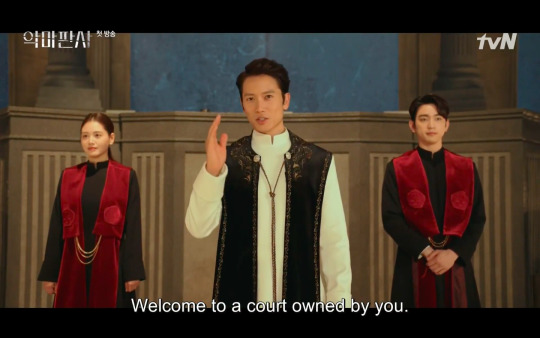
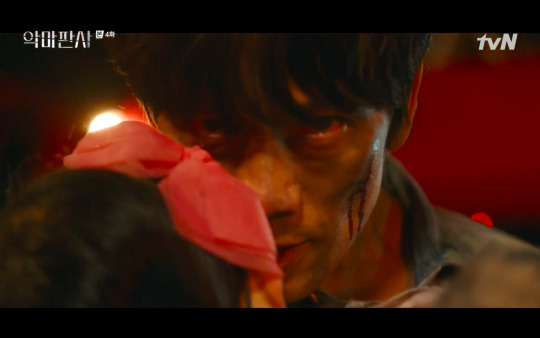
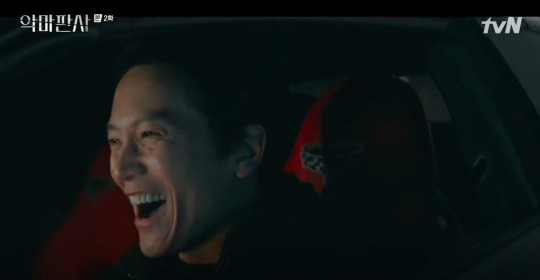
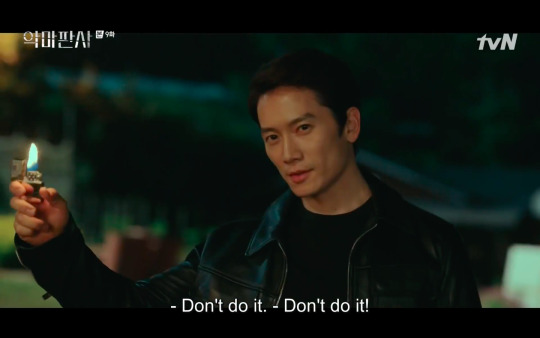
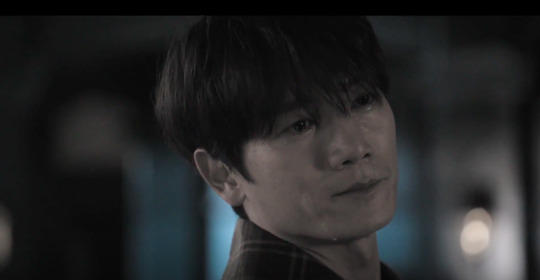
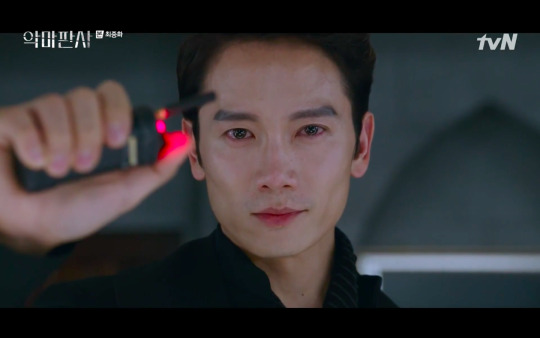

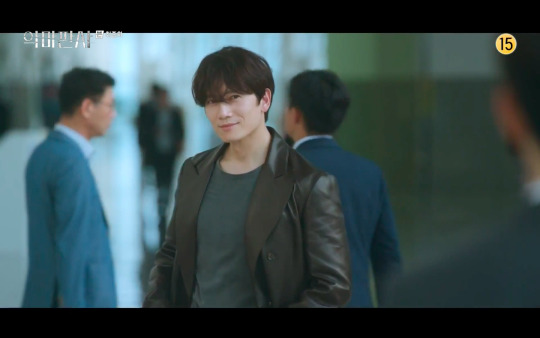
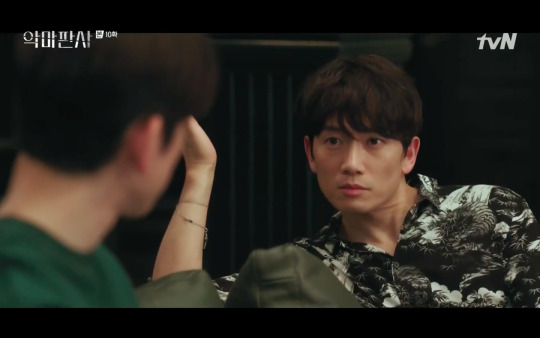

(They had no business in making Gaon have this kind of dream, those german scissors left a ... strong impression on him haha)
— Kim Min Jung’s depiction of Sunah’s was hauntingly beautiful, a femme fatale who kept a broken child deep inside (and at the same time surfacing on her manners and personality) and a strong businesswoman. It’s a fascinating character i loved hating as a villain but still sympathized with. The scene where she murdered the former foundation’s president sent me chills down my spine (i still have her shot of her, sitting at his bureau and manipulating his speech video)!
The melancholy slipping through her facade when she visited the mansion the first time in a while, as well as her devastation in front of the President’s scheme, by the young girl’s bed at the hospital were memorable. The tension between her and Yohan was incredible: they both managed to keep a very disturbing but enthralling aura, tangled with nostalgia at the same time each time they met.

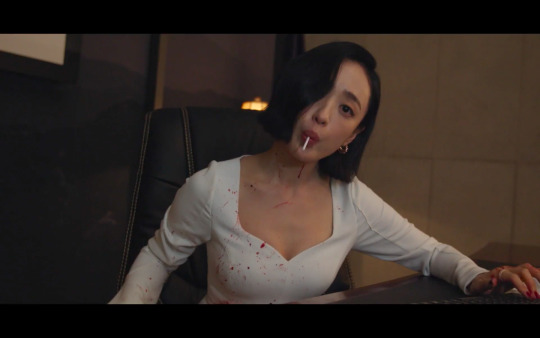





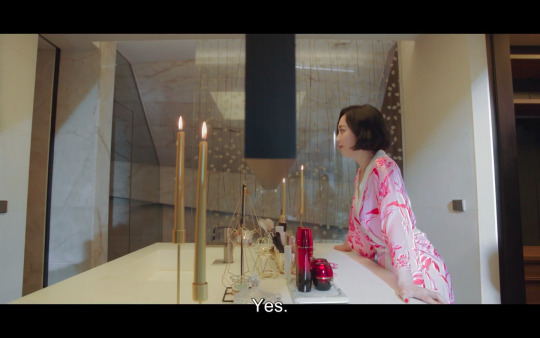
(Looking at her reflection is a recurring pattern for Sunah’s character, i found this shot above interesting, divided in the two ends of the mirror, as if her self can’t be found on the other side anymore)
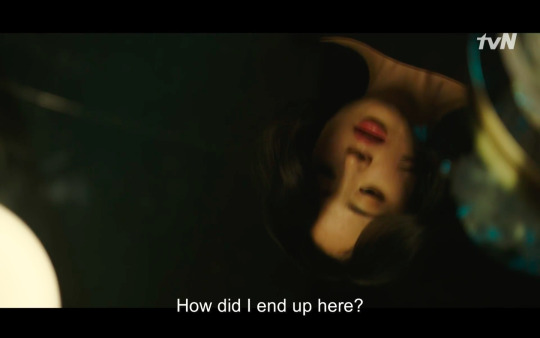
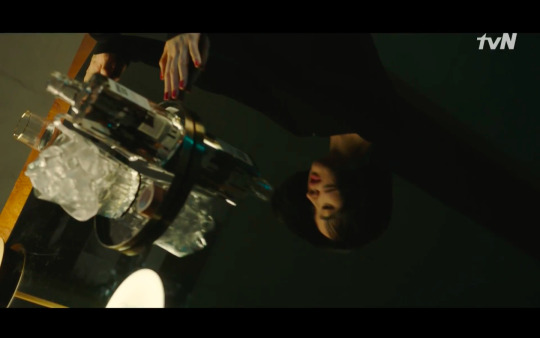
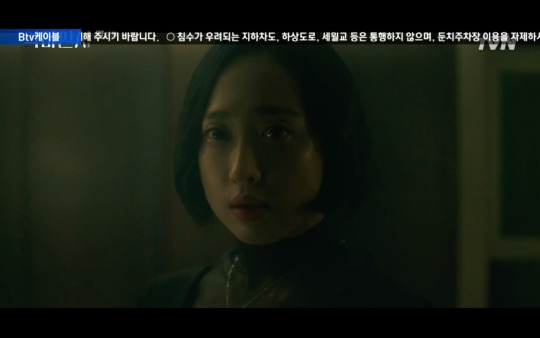
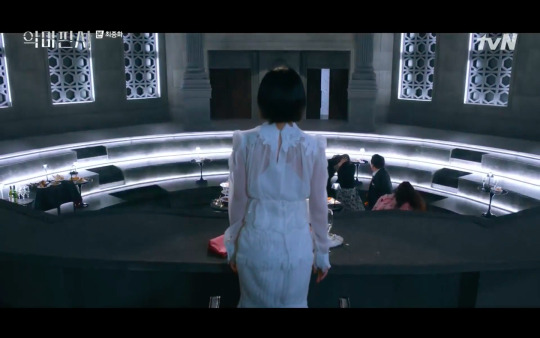
— This was the first time i saw a drama with Jin Young and i really loved his playing! Never thought I’d say one day i enjoyed someone’s tears and rage on screen, but his crying scenes stuck with me, especially in the prison yard and the last episode (he deserves therapy after all he went through, really) …
And his letter to Elijah … (i’m glad nobody harshly revealed the truth to her, i’m really glad!)
I loved to see how his gaze evolved through this journey with Yohan. His endearment to Soohyun, Elijah and Yohan was very precious ;; Even though Yohan was the one who was first seen feeling lonely, Gaon’s loneliness since his parents’ death slipped through his seemingly fine world, i found that interesting!
(And on a lighter note, i’ll always remember the truth behind Mrs. Ji’s cooking, Gaon’s epic reaction, and the pure comedy she gets to own a healthy food shop thanks to Yohan!!)
I also enjoyed his supportive friendship with Jinjoo!!
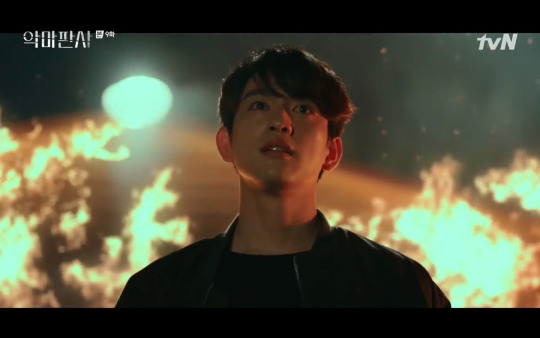
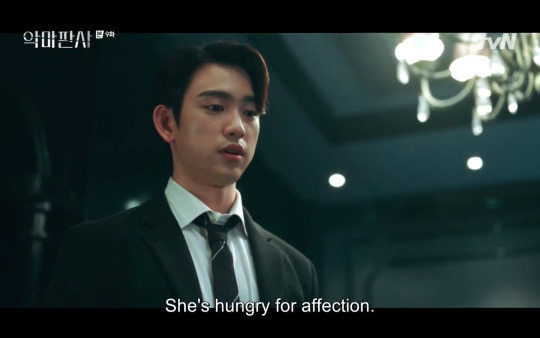
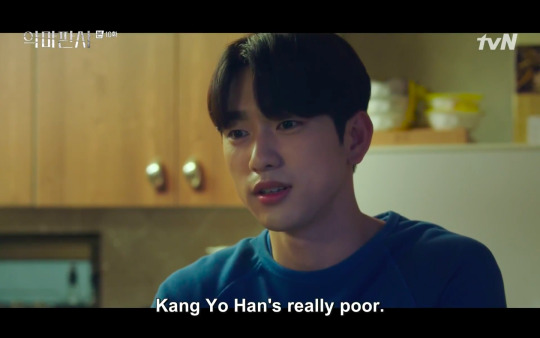
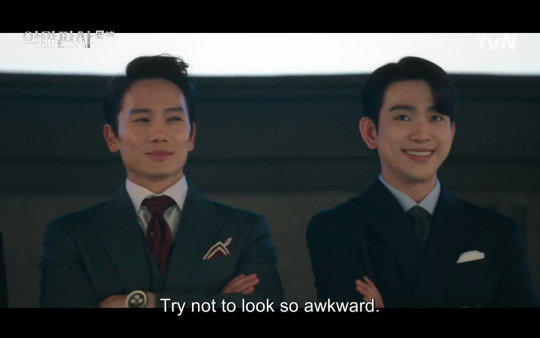
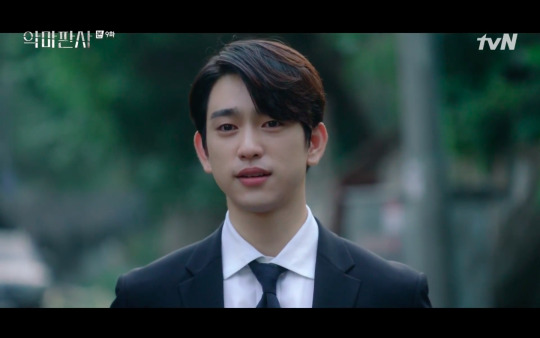
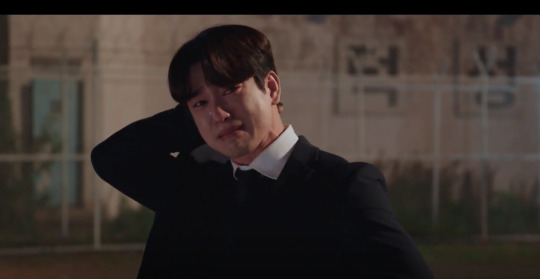
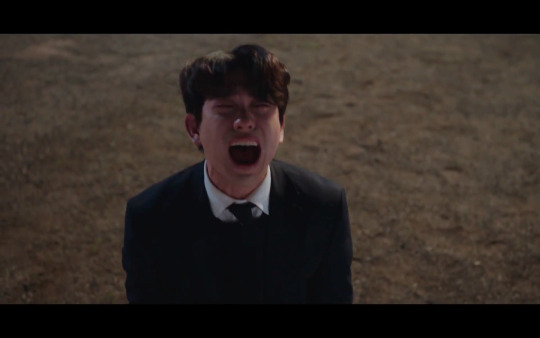
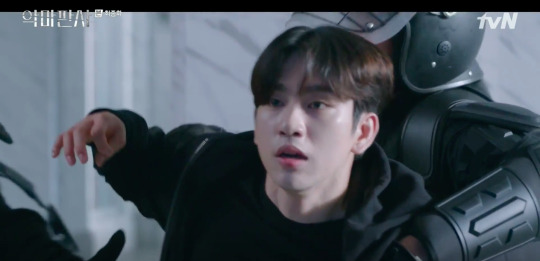

— Park Gyu Young’s acting was also on point! It’s really too bad she didn’t get more screen time because i wanted to know more about Soohyun!! I felt robbed haha, because when TDJ began airing, they introduced her as one of the ‘main’ characters of this story ;; The scene when she was on CKH’s suicide scene really left a mark on me + when she was confronting Yohan, especially after she took Elijah out!
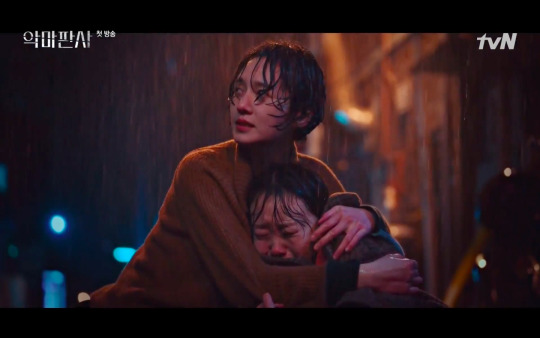
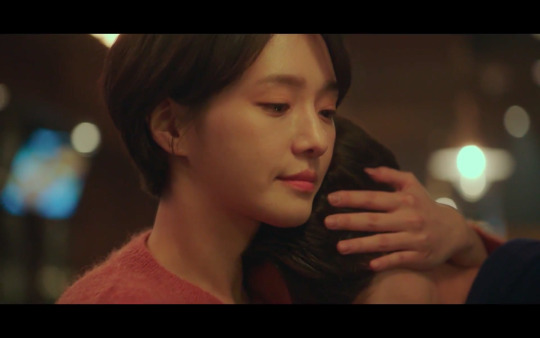
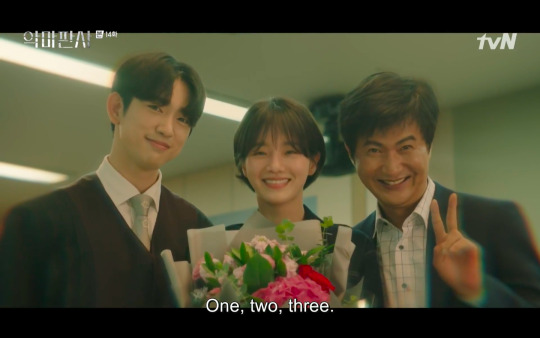

— Elijah. Just Elijah, our best girl!!! Apparently it’s one of Jeon Chae Eun’s first roles, she did so well!! Along with Ji Sung and Jin Young, she gave a whole new definition to the Domestic Scenes, i swear. These scenes will keep a special place in my heart for a long time! Her adorable smile and cheekiness were a refresher in this show!

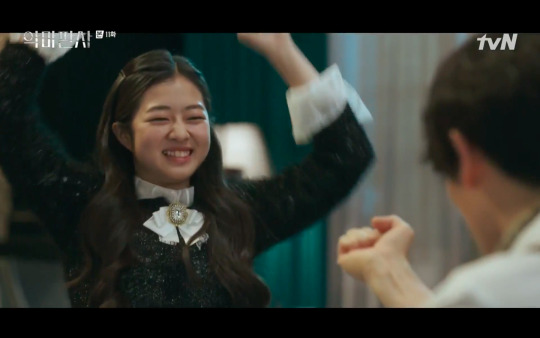
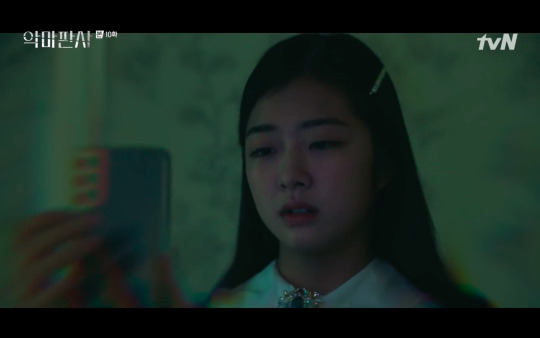
(They could change TDJ’s concept in a second season and make us a domestic slice of life series, i wouldn’t mind AT ALL! Take my money!!)
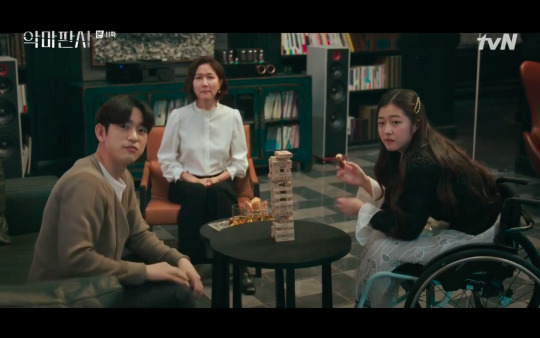
Seeing her complicated relationship with her uncle unfold before us deeply moved me. The complete loneliness she silently depicted moving to her bed in the wheelchair, after Gaon left the mansion was heart-wrenching. And also the scenes after Soohyun’s death, hurting with Yohan seeing Gaon’s pain (the way she spoke her worry for the two of them, Yohan couldn’t let the words out properly to Gaon).
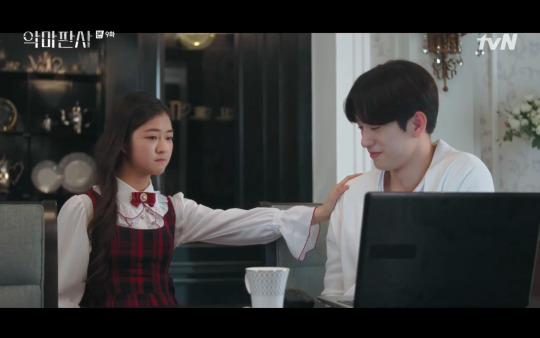

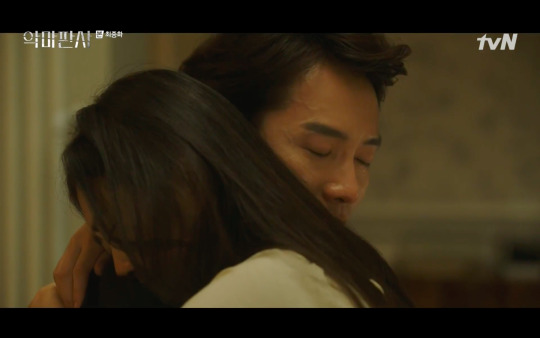
— CKH’s character, played by Jang Young Nam, was amazing. Her acting already shattered me when i watched Nobody Knows! Her cold gaze, her harsh tone, she was badass i have to admit!
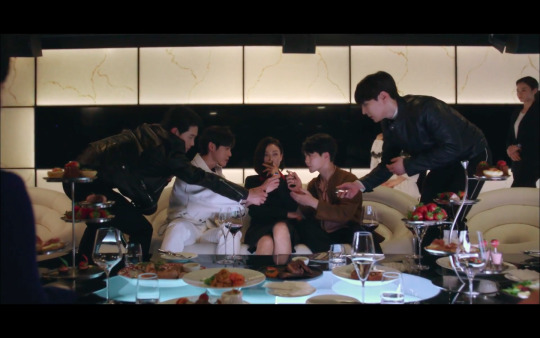
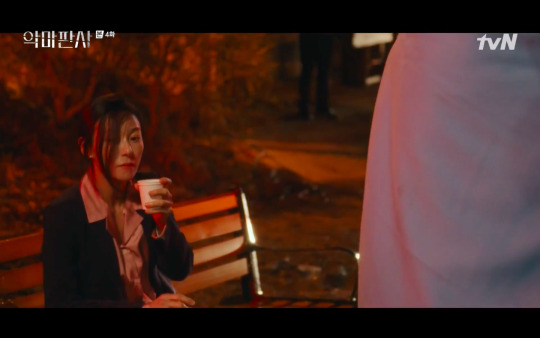
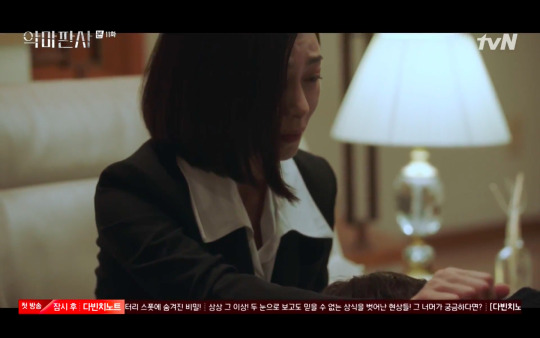
The narcissistic rage was well depicted in her character, and even though i get where many’s opinions on her death come from (i share it too sometimes, but i feel it more for Sunah), i found this final decision fitting to the character, especially if you look how she treated her own son (each hold felt like a grip from rage eg. in ep. 3, as she maybe felt her son was the cause of her demise).
(HUGE SPOILERS FOR BEYOND EVIL BELOW!!!!)
She reminded me of HKH’s ending: seeing his path to success was crushed with no way out of it except death on his own accord (in his eyes, because it was his absolute life aim, every single being, to his own wife and son, and means, even bending the justice independence, were his expendable ways to pave his path), HJW’s father was set on suicide before his son barged in.
(Funnily enough, the filming spot for CKH’s house is the same for HKH’s house haha)
— And also … Lawyer don’t-worry-i’ll-get-you-out-on-probation Ko deserves a round of applause for the best lawyer he is hahaha
THE STORY’S DEVELOPMENTS (AND SCRIPT). I feel like this story could very well have been developed on 20+ episodes! Even if i know some scenes in a script are sometimes (bound to be) cut in the drama, TDJ’s script leaks make me feel there was SO much more to be told, and so much more to explain some plot events in the airing drama!
Because the story was ambitious, both character and plot(twists which give you whiplash)-driven (and also the filming context with the pandemic), i feel like some choices were made.
The lines of thought about justice and the drama’s attempts at its ‘true’ definition are not lost on me. It was really interesting!
On a side note (there will be many, bear with me haha), the symbolic behind the app’s name, DIKE, which i’m pretty sure (correct me if i’m wrong, i only have some very rough basics in korean haha) is the korean romanization of Nikè, or in ancient greek Νίκη, the greek divinity of Victory ( ‘ㄴ’ in korean sounds like an ’n’ but its pronounciation is more abrupt/brisker, to the point of what could be sounding to ears like a ‘d’).
Nikè is most of the time represented as an attribute to other greek divinities who also embody the victory eg. Zeus or Athena, thus seen as a bestower of victory (in any domain, be it war, games = interestingly enough, the live court is set in a colosseum-like room, arts, …) to the humanity on behalf of these gods (Nikè sometimes stands in her palm as an attribute of Athena, like the owl or the helmet).
But sometimes Nikè was also revered an independent protective divinity.
Nikè is represented as a winged divinity in a long robe, flying above the victorious, assisting the humans in their works/challenges eg. handing them a laurel crown as a sign of victory, or a helmet, etc.
Its mostly known representation is the Winged Victory of Samothrace (or The Nike of Samothrace) sculpture in the Louvre. The brand Nike also used it in its logo.
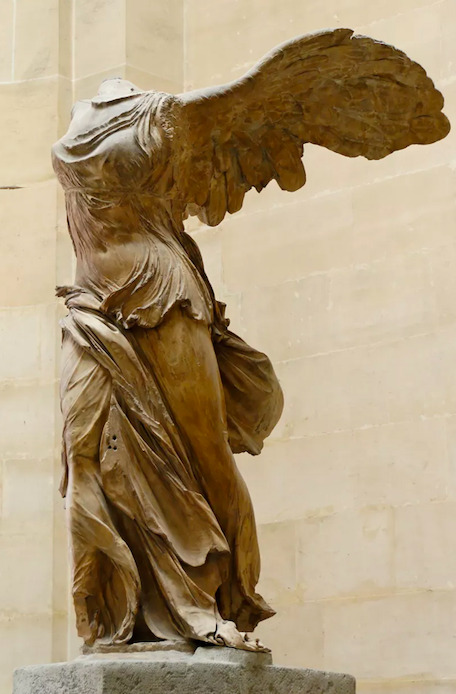
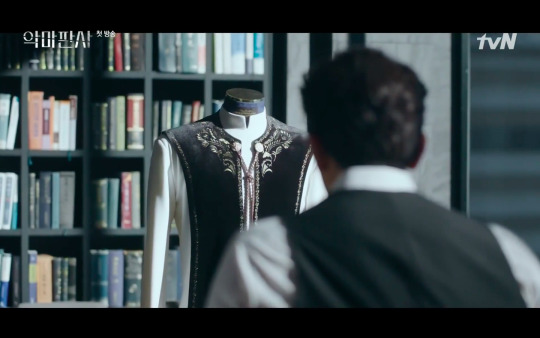
It calls back to Yohan’s line: « I make sure i win before the game starts », and in fact, since the beginning, unbeknownst to everybody witnessing the trials and participating to them, the app was his way to win. It foreshadows the ending of the story, Yohan finally taking down the foundation.
It also adds to his god/devil image: he assumes the role of the intermediary/abyss of the « gods » (the Justice), taking in all the hubris of the society in order to bring the justice (well, guess we could say it put some hold to the cycle of the powerful culminating to chaos?) back, in some sort of catharsis through DIKE.
It might be a stretch, but Nikè’s winged representation could be found on Gaon’s tattoo (at first to me, it looked like a phoenix/winged angel, which symbolizes a ‘reincarnation’/new beginning for Yohan finding peace, a second chance to his past and Elijah thanks to Gaon & Gaon finding a new world even if his first crumbled ie. his parents and Soohyun’s death and professor Min’s betrayal).
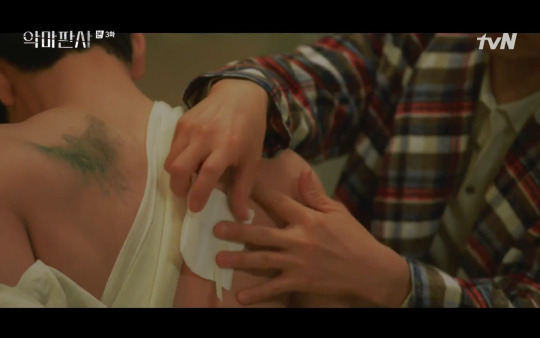
(The whole virus plot by the end of the story made me feel a little uncomfortable given the actual context and the conspiracy theories that are spreading, but it wasn’t used carelessly and served the commentary of the powerful and how far they would go, i think? That said, a fiction, especially a dystopia like this, stays a fiction but when they used it, it gave me a forced laugh haha)
Now, if someone gets to translate some script bits, i’m really looking forward to:
K’s backstory!!!!!
Isaac and Yohan’s past!!!!
More about Elijah!!
Where’s the cat???
What was the script saying for Gaon and Yohan’s confrontation in ep. 12? When Yohan faced the window, waking up from a nightmare after Gaon left?
ABOUT SOOHYUN’S BACKSTORY. (Now, this will get long, i’m sorry but i needed to let my thoughts out haha) The drama introduced her as one of the four main characters with Gaon, Yohan and Sunah. I had so many expectations for her character! Especially from the three scenes we got of her:
➔ In the first episode, we see her save a young girl in the street from two men, looking up at the poster « A safe Korea will be realized from now on. »: it was a great introduction to the blatant lie of the ‘safe’ dystopian world that was being created in the story. It also showed how Soohyun felt in front of this insecure world.
A side note, but seeing her hug the young girl like that reminded me the hugs she gave Gaon: she wanted to protect him from this unjust world with all her might (especially the scene in the restaurant where she hugs him).
➔ Her two confrontations with Juk Chang!
➔ Her dilemma and emotional turmoil when she erases Gaon’s presence in CKH’s office.
She was portrayed in the story as Gaon’s pillar since his parents’ tragic death and his moral compass. She’s the lawful citizen, despite feeling helpless to the world’s changes, who hopes it could be saved as long as the rule of law is preserved by everyone, and this begins by respecting it themselves.
But she was not standing around and i kind of regret this was not shown more in the story: she kept doing her best in the « system », fighting from the inside the injustice hoping the little changes could make a difference someday. Because she couldn’t take Yohan’s path, in no way: the system/the law must be respected for it to be sustained. And i’m glad they addressed this point in the drama: Yohan chose to take on the role nobody wanted or even dared to assume, knowing fully well he became a criminal the second he began his plans (just as lawyer Ko said he was no longer a lawyer once he sided with him).
This must not be glorified, nor vilified. As he said, it was a choice he decided to make. She mirrors his choices to some extent and i would have loved to see more of their interactions or her thoughts about that! And how she worked through the system to change things, her vision of the justice. They showed us the flashback of her career choice in high school, and it could have been interesting to learn more about her!
A backstory about her saving the youth and meeting Sunah by accident would have been very interesting (given Sunah knew all about her since the beginning and ordered to kill her). Their meeting wouldn’t have foreshadowed Sunah’s plans, quite the opposite, and it would have given more ‘substance’ to her plans. We were robbed of this relationship haha!
And of course, seeing her side with Yohan & Gaon for a short while (because seeing her team up with them all along the way could’ve been a little ooc) would have been dope. Her arresting Juk Chang while the two of them stop the gang was the closest thing we had to their teamwork ;;
Among the drama’s main focuses (the self-pity of the powerful and the never-ending cycle of their greed, the power displays it ensues which come in many forms in the system’s game), the conception of justice was developed all along the drama. It would have been really interesting to see whether Soohyun’s conception of justice could have changed in her own way!
And professor Min’s potential manipulation of Soohyun!!! Some scenes on their interactions could have been nice to see and explain why she focused solely on Yohan, the only side of the whole story she knew! Her reporting to the professor about her investigation (and him feeling she got too close to the truth) would have made sense because, as she saw Gaon growing apart from her as he was getting closer to the Kangs (especially since she saw him interact with Elijah when they invited her to the café, like Sunah saw how Gaon fit in their family at the dinner scene), she would’ve wanted to protect him without him knowing because she knew it’d have hurt him. It could have paralleled Gaon’s reports on Yohan to the professor at the beginning of the drama. And that could have explained (aside from the whole love triangle dynamics they had) her reluctance to tell Gaon Yohan was the one who told her his whereabouts when he was in danger in ep. 13 ; this scene also was one of the only moments addressing the lack of communication in their relationship. Seeing her feeling confused over Yohan could have been interesting!
(This also got me wondering whether in the script, Yohan’s injury was ever addressed.)
Also, i’m curious about her family, if the script mentions something about them: did they know Gaon?
About the loveline between Gaon and Soohyun: while the friendship could have stayed as is (it already felt pretty genuine in my opinion and strong friendships also deserve to be portrayed in stories), i’m convinced this drama wanted to set Gaon as the center of a subtext love & morality triangle between Soohyun and Yohan (and K and Sunah on Yohan’s part). I think i would’ve appreciated Gaon and Soohyun’s loveline so much more if they developed it more! And it had to develop in the very same episode she died: apart from the confession and kiss scene (i’m curious about the scene’s description in the script), the flashback of their moments, seen from Gaon’s pov, came just right in to ‘explain’ it!
Of course it wasn’t the main focus of the story and there was already so much happening, but their new relationship development and her death almost had no impact on me even if it was set as a turning point for Gaon (and K for Yohan, as a cement to their respective decision to fight the system and how they would do it), and it made me really really sad! Of course it was a plot device (and i now wonder what would’ve happened if she or K wasn’t dead), but if it was bound to happen, the emotional impact was lessened!
Jinjoo’s character development and her relationship with Sunah happened really really fast, and i wonder how the script describes it!
Sunah’s involvement with the juvenile care center!!! Her scene at the hospital left me really sad.
(Also, on the love plot, Gaon and Yohan jealousy bits weren’t used later as an expression of their envy towards the other’s status/life/etc. and were actually directed to people outside ie. Sunah/K/Soohyun in the plot, which makes me think they really wanted to set it as a love triangle!)
ABOUT SUNAH’S DEATH. I feel really really conflicted on this point. Her story was a parallel to CKH (and of course Yohan, i’ll talk about it below): two women — coming from totally opposite backgrounds — climbing their way up by their own means in this power circle. And despite all their accomplishments unnoticed (because they were the ones seeing through their plans while the others were mainly seen tearing each other into pieces), they could still be ruthlessly ejected from this world any day, part of it because they were belittled as women all the same, and chose to end her life on her own accord, still having agency over it.
As someone else pointed it out, it also acts as a « poetic » retribution for her murder of Soohyun and K. BUT her exiting the scene in some other way staying alive could have contrasted with CKH’s suicide (especially since she overthrew the president who was the only one on her side getting in her way and even killed him in the end). Especially in a show that deals about how the justice can be carried out!
Of course, Yohan and Sunah were a foil to each other in their respective fights and traumatic past: the drama showed us how having someone to reach out to and protect (Elijah, Isaac and Gaon to Yohan ; Soohyun, Yohan and Elijah to Gaon) can become a driving force. Sunah, despite thinking this could be a weakness, also longed for companionship (from Yohan mainly, but also from Jaehee), and had no one to stop her crossing the line and preserve her from herself and the world. At least someone hearing her story, staying by her side and trying to understand her.
Each time she said ‘can you be a little nicer to me?’ to Yohan made me feel for her (and also that one call with Jaehee), it was the only cries of loneliness she silently let out!
On a totally random note, i would have loved to see her interact more with Gaon (especially by the end of ep. 15, when Yohan was arrested)!
The story gladly didn’t end Yohan’s traumatic past and growth in death, but what about Sunah?
In any case, Sunah was a really good and complex character, i enjoyed her character!
What about Jaehee? How did she react to Sunah’s death???
What about CKH’s family after her death???
I would have loved to hear more about Sunah’s plans as well! Scenes where she would play with Gaon for example (in Yohan’s presence or not, like at the photoshoot)!

(This comment above foreshadowed, along with the dinner scene in ep. 11, she used him all along!)
Her involvement behind the scenes was only exposed in ep. 15 but i wanted to know more about her (motivations aside from her focus on Yohan, what did she plan to do before finding out a look-alike to Isaac, ...)! Given the elements in the plot, i get the idea she planned this whole business with the foundation first to reach the top and wanted to bring Yohan up with her (eg. leading the foundation or becoming the president) or down without her along the way, because she wanted his companionship. Maybe the script expands on it more? Did she really believe in the Dream Home project? Because as we saw her speech in the juvenile care center and her strong reaction to the youth being harmed in these schemes, i believe she kinda wanted to protect them as the best revenge on her past, because nobody could do it for her?
THE ENDING SCENE. The ending was pretty good and didn’t give us an all-out tragedy, so i’m really glad! I still can’t believe Gaon was ready to blow his life away once he learnt Yohan’s death AND wanted to die with him (falsely) realizing Yohan wouldn’t change his mind, dead set on his decision (no pun intended!). And Yohan’s reaction to this ...............
Now, their last scene is left to the viewers’ interpretation, but it felt to me like a new beginning to Yohan and Gaon’s relationship! As it was already said by many people on tumblr, Yohan wasn’t sure if Gaon would still be by his side despite it all, and he didn’t expect Gaon to feel this way. They’ll definitely meet again, it’s a promise of more in the future (especially Yohan’s nod, on the verge of tears and Gaon’s two relieved/endeared smiles, full of forgiveness). Gaon will join his new world once he’s done or they’ll come back to him once Elijah’s recovered.
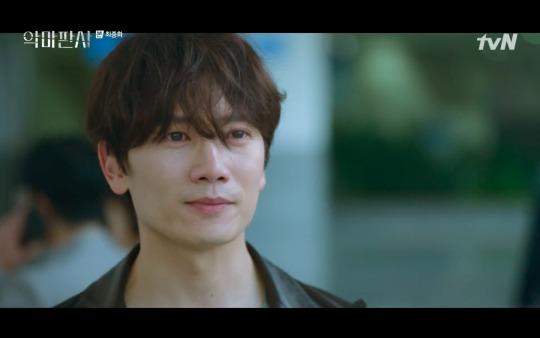

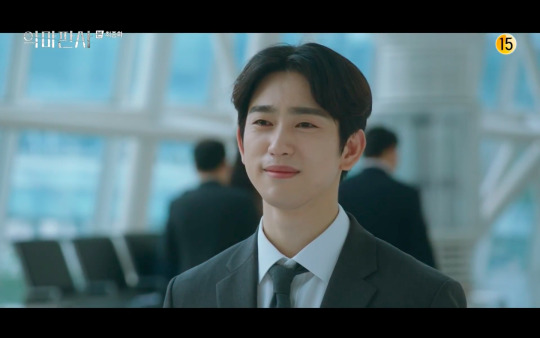
And this game of hide and seek/hunt reflected their relationship development: Yohan felt unattainable at first, but he chased after him in the maze that was his devilish game, symbolized by the crowd, chasing him motivated by his suspicion, curiosity, anger and hate, disbelief and disappointment, empathy, worry, affection, desperation and love, until he finally reached him and they understood each other among all the crowd, living metaphorically in the same time, facing each other on the same (ground) level.
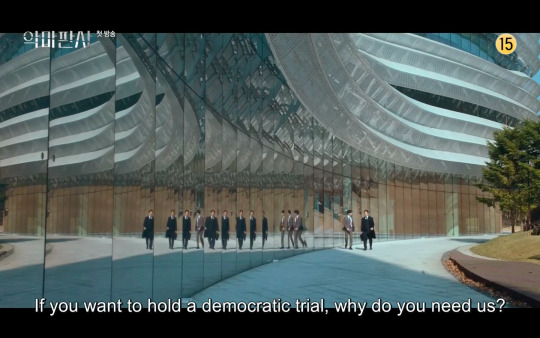
(A scene in the first episode, Gaon seeing a maze of Yohan’s reflections, maybe symbolizing he could not see through his facade in the beginning, being an enigma to him at first sight ; the choice of the reflections in the mirrors through the drama is interesting and reflects the story: depending on the angles, a story can hold as many meanings as there are points of view, the complete image surfacing once everybody’s story is told)
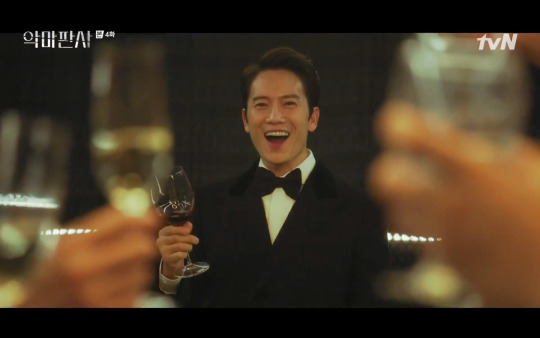
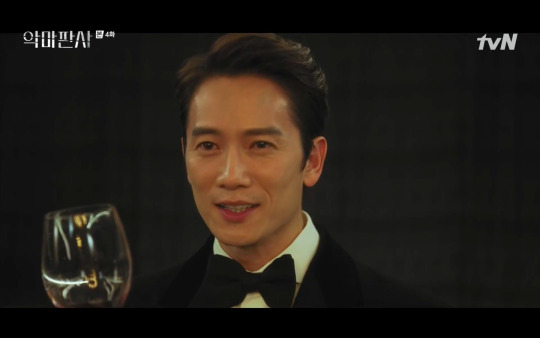
(Just like how, in ep. 4, Yohan shows Gaon the wicked system right under their noses, Gaon’s enraged and confused gaze directed right at Yohan after they all block his view by clinking glasses ; Yohan hoped he would understand what lies beneath but Gaon understands it fully through his own past in ep. 7-8)
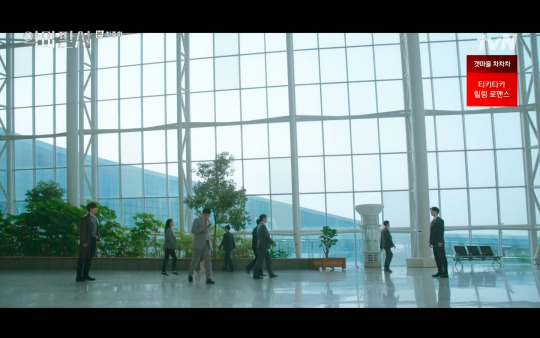
(The crowd is cleared from their/our view in the final scene, leaving the two of them facing each other without any obstacle/reflection on their path)
Gaon kept Yohan’s watch all the time even in moments of doubt, sorrow and rage (the best PPL in drama history so far haha), Yohan finally got to Gaon and entered his world as Soohyun did, reaching out when he needed it the most, to stop him doing something he would regret deeply. It was symbolized by the scar he got on his left hand from preventing Gaon from stabbing him (that’s also why he caresses his scar in a bittersweet way, lost in thoughts, reminding him of their last meeting).
As @i-guess-it-rains said + according to the BTS’ editing (it passed off as a joke but i can’t erase it from my brain now haha), the way the scene where Yohan defused Gaon’s bomb was framed looked at the same time like Yohan was also carefully handling Gaon’s heart (the bomb countdown clock radiating a red glow on his chest), on the verge of exploding. Now i have The Nights lyrics in my head haha (« My heart is going back to you, i just don’t know »)
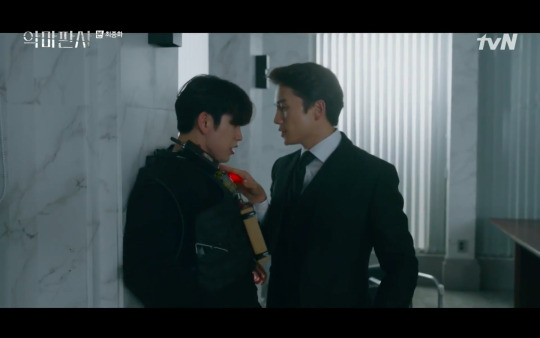
On another note, i realized that in ep. 12, after Gaon left, he’s seen trying to call Soohyun in order to reach for her since their last confrontation, but right before, his finger glides over his contact, hesitating on Yohan’s contact before choosing to call Soohyun.
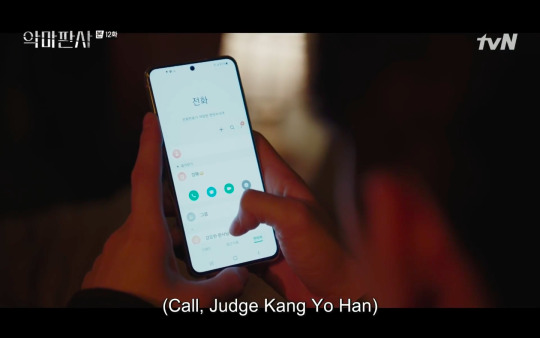
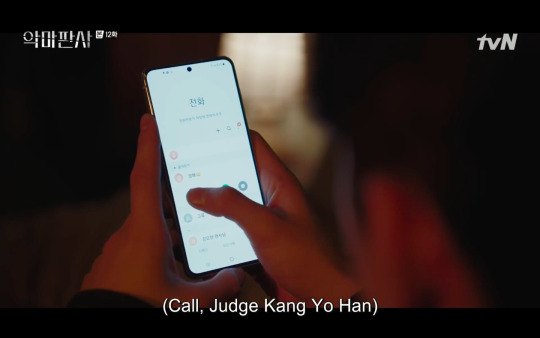
While in ep. 8, he only reaches out to Soohyun after his breakdown in the prison yard (without thinking to call Yohan because he was in the core of his doubts and pain at that time and needed space to reflect on all the events):
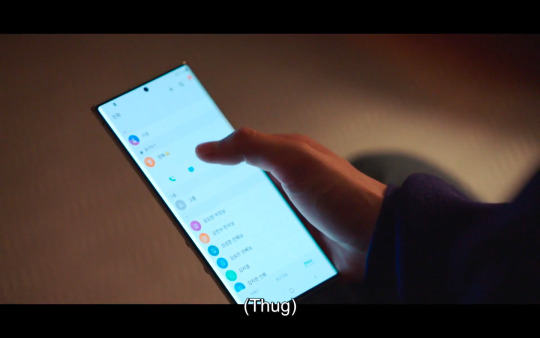
And it parallels to Sunah attempting to reach out to Jaehee in her loneliness at the top, hesitating before deciding to call her.
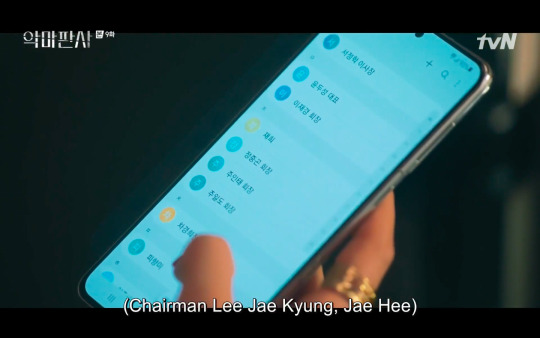
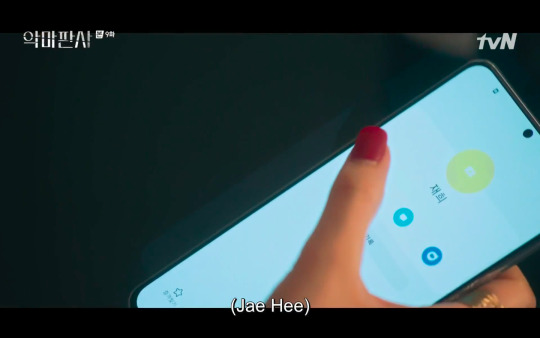
Now i hope TDJ will be on Netflix! It’d be very nice to get to watch the drama in high quality and have more people to see it!
I heard it got a webtoon adaptation so i also look forward to it once it will be translated!
A SECOND SEASON? When i first saw the ending, i thought it got wrapped up nicely and didn’t « need » another season, but it also left some parts open and laid out a new background for further developments (the system repeats itself but in another form, Yohan leaves the scene with his signature smile, maybe up to something else again, saying metaphorically or irl to Gaon he’ll come back if he doesn’t do well), kinda like Stranger/Forest of Secrets s1 or The Guest ending (the corruption doesn’t end there). I also heard it got high viewing rates in SK, so maybe it will be taken into account?
And well, i’ll miss the cast so i would welcome the idea haha
THE SOUNDTRACK. The whole OST was stellar (and their titles are on point really!)! Getting to hear it without voices or noise over and with my headphones on made me realize it was even more beautiful!
Because I Have You, Warmth That Melts Loneliness and If Only… are the end of me (especially If Only aaaaaaa)! Don’t get me started on Enemy of Truth’s title to the OST playing for the church fire because it’s devastating ;;;
If Only’s title … It leaves us filling in the blank space, the dots to Gaon’s thoughts when he learns about Yohan’s past and how it impacts him to this day.
The 4 songs were amazing (there’s also Different from the Outside but i still didn’t get its lyrics). Tempest was definitely etched in my mind as TDJ’s main theme haha
And The Nights was my favorite!
➔ Tempest was Yohan’s iconic theme and depicted his lonely path to revenge after the tragic events in his life, and his (fated) encounter with Gaon, how deeply it will change him in this journey in ways he didn’t expect. It perfectly introduces (with Chet Faker and Flume’s Drop the game) and concludes the drama!
➔ What you gonna do was THE revenge epic song making everyone revel in the ‘bad guys’ despair and Yohan’s badass moves!
➔ The Nights felt like it was both Yohan and Gaon’s theme and Gaon’s sorrow after Soohyun’s death: at first i thought it was only Yohan’s, but his revenge and the last episodes proved me wrong!
The song’s lyrics mirrored themselves (‘my/your night shines on you/me’), as if a complete understanding between Yohan and Gaon was found on their dark road.
Yohan’s night shines on Gaon: Yohan’s broken past and all his misunderstood or hidden sides, his dedication to Elijah. Yohan’s rage (almost wrath since the biblical and god symbolism are there haha) and desire to take the inique system down waked Gaon’s own rage, buried deep inside, and made him move forward too.
Gaon’s night shines on Yohan: all the time he spent with the Kangs, Gaon’s deep empathy and understanding, helping him reconnect with his niece, their dinners at night, his rage exploding when the truth about his parents was revealed, his desperation on the last two episodes (in ep. 15, seeing Gaon’s realization everything was a lie and Yohan was innocent, and in ep. 16, Gaon wanting to die by his side).
Gaon’s night also shined on Soohyun, who wanted to protect him with all she got each time she saw him crumbling down.
There was still light on their dark road (which looks like a callback to Nightmare’s lyrics, « Save me from myself / Save me from this darkness that has lost its light »).
➔ Nightmare felt like it was Yohan and Sunah’s theme. When it last played when Sunah’s death happened on screen, it left me speechless (and if i remember correctly, the ‘save me from myself’ bit was played right when she shot herself … o u c h)!
19 notes
·
View notes
Text
UNIT 4. Message/Audience/Context. WEEK1 - Headless Chicken /Intro
No, I’m not crazy. I know the title of this post may seem strange. And it is. But, I swear, it will make more sense very soon. Think about my facial expression when I realized that this was the title of the first week of class of the fourth unit of the course I’m taking. I am going to explain you. Think of the expression headless chicken as the intention of acting without thinking too much, letting go of instinct. That is what we were asked to do. For someone who, like me, is used to thinking too much, it was very hard. But first, here is what was at issue. We listened to an audio that at first glance sounded weird. It seemed to be something like a poem or rather a nursery rhyme. Rich as it was with onomatopoeia, images, and rhymes. Each of us has been given a sentence from this extract, and without knowing its meaning, purpose or context, we have been asked to interpret it freely in our own way.
This was my sentence: "...while you hee. But wait. Low in dark middle heart. Embedded ore."
I won’t tell you the context either for now. I want you to feel lost, as I felt at first.
I had absolutely no idea what it meant. So, I first looked for the meaning of words I did not know:
-hee (interjection) An expression of laughter.
-embedded (adj) Enclosed firmly in a surrounding mass; inserted as an integral part of a surrounding whole; part of; firmly, or securely surrounded; lodged solidly into; deep-rooted; partially buried in concrete or planted in earth.
-ore (noun) a mineral that contains metal that is valuable enough to be mined; metal as it comes from the mine: metal mixed with earthy and other substances.
Then I started to think about the first images that came up in my mind reading this sentence: Dante’s Divine Comedy, The Lord of the Ring, Journey to the Center of the Earth by Jules Verne, The Rabbit Hole from Alice’s Adventures in WOnderland (dark middle earth), Joker’s laugh (hee), Time (but wait!), People’s heart or soul (Embedded ore).
I immediately felt a strong connection with this sentence, related to the fact that I imagine that embedded ore as my identity as a creative, as my creativity, stuck in the middle of darkness. In fact, over the past few months I have been thinking a lot about my future, my career as a creative professional, coming to question even my skills, my potential, and the distinctive features of my work. This is the main reason why I immediately made a sentimental connection to the words I read. Probably, because it is a very delicate subject I had serious difficulties to let go and to freely interpret this sentence.
So I decided to try to complete the sentence since it gave me this sense of not completeness precisely, to try to evoke a more concrete image in my mind. And I wrote down some few words, creating a sort of short poem:
“I am crying
while you hee. But wait!
I will be able to pull it out.
There, Low in dark middle earth. That Embedded ore. My Embedded ore.
And I will show it to you.
And then while I hee, you will cry.”
But it still wasn’t enough to help me figure out what the right path was.
1 note
·
View note
Text
“Not As Lost, Violent Souls:” Alex Manes and T.S. Eliot’s “The Hollow Men” -- part 1
- intro -
Epigraph: Connections
Alex's connection to "The Hollow Men" begins as early as the poem's own epigraph--a pair of referential lines that open the poem. The first, a reference to Conrad's Heart of Darkness, a story about imperialism, racism, and a man growing disgusted with the "civilized" world, which brings to mind Alex's speech about war and atrocity from episode 1x12:
Kyle: What if there's some truth to it? That the aliens are killers [...] What if the good ones are the exception to the rule?
Alex: You just watched your government blow up a building full of elderly people. Your brain is trying to justify the slaughter so that your government can be right. You want to believe that we're safe. That goodness prevails. That's the coldest reality about war. Sometimes you're just doing what you're told. Then, all of a sudden, things are burning, people are screaming...And then you look around, and you realize that the evil is you.
The second epigraph reads "A penny for the Old Guy," a reference to Guy Fawkes and the custom of asking for pennies with which to buy fireworks in the days leading up to Bonfire Night. Drawing this parallel to Alex, I ask: who is he? Who is Guy Fawkes? Depending on who you ask and when, Fawkes could be either a Catholic dissenter who planned to blow up a government building and failed miserably, or he could be a revolutionary anti-government symbol. And who, in turn, is Alex? Is he a soldier following orders and fighting his father's battles despite his own principles and desires? Or is the the "black sheep" of his family, doing what has to be done to survive and shoulder the burden of his legacy, working to make the world a better place? And will he succeed or fail, as Fawkes did?
And that's just two lines, placed before the poem even begins. I did say this was going to get long.
Part I: The self in effigy
Getting into the poem proper, the first stanza reads as follows:
We are the hollow men
We are the stuffed men
Leaning together
Headpiece filled with straw. Alas!
Our dried voices, when
We whisper together
Are quiet and meaningless
As wind in dry grass
or rats' feet over broken glass
In our dry cellar.
The first image of the poem, the "stuffed men...headpiece filled with straw" is a scarecrow or effigy, continuing somewhat from the epigraph of Guy Fawkes. This dummy (meaning an inanimate, man-shaped object) is a constructed being in a shape of a man, empty inside, created for a purpose outside its own, created to be used and discarded. The scarecrow's only purpose is to sit alone in a field, subject to the slow decay of the elements; the effigy's purpose is to be burned, often to make a statement against its subject. In a sense, Alex the soldier is a scarecrow set up by his father—set up for a purpose and left alone in the proverbial field to protect the farmer’s interests, aka his father’s legacy. And in another sense, Alex the soldier is an effigy of his younger self, burning to prove a point. Both the scarecrow and the effigy are powerless; as the poem says, “Our dried voices…are quiet and meaningless.” Eliot scholar Grover Smith says of the "figurative straw dummies" that they
[D]esignate not only the ineptness and spiritual flaccidity of the speaker, but…his inability to attain love. If one turns back…to some of the most ancient as well as the most persistent rituals of pagan Europe, it is the straw men who seems to have functioned in certain of the fire festivals as a sacrificial representative of the vegetation spirit or as a scapegoat ridding his folk of accumulated ill-chance. (Smith)[1]
And, then, connecting the straw dummy symbol once more to the epigraph, Smith says “the commemoration of the fifth of November itself reflects the custom of burning in effigy the bearer of local guilt, the accident of the season.” The idea of Alex as a scarecrow, essentially a puppet, calls back to his words in 1x13 that ever since he enlisted he has been fighting his father’s battles and barely recognizes himself anymore. The idea of Alex as an effigy—the “bearer of local guilt”—calls back to the idea that becoming a soldier would constitute a change of state for a young, gay kid into a “real man.” Neither is a charitable or wholly accurate reading of Alex’s enlistment, but nor are they wholly inaccurate. Alex and his father, so closely enmeshed in his identity as an airman, have both at different times seen him as a puppet and as an effigy, as represented in the symbolism of the poem.
The poem continues with a couplet:
Shape without form, shade without color
Paralysed force, gesture without motion;
These lines describe the state of the hollow men, only half of what they should be, held back and impotent. I don’t have much regarding Alex to say about these two lines, but they are a useful point of reference for later in the poem when these contradictory dichotomies come up again.
Next, we look at the final stanza of section I:
Those who have crossed
With direct eyes, to death's other kingdom
Remember us - if at all - not as lost
Violent souls, but only
As the hollow men
The stuffed men.
Much has been made in scholarship of “The Hollow Men” of the image of the eyes and to what Eliot could be referring by “death’s other kingdom.” The eyes are, as stated in Eliot’s own letters, a reference to the eyes of Beatrice that persist throughout Dante’s Divine Comedy—the eyes of the main character’s lover. So here I mention Michael for the first time. If I am assigning Michael to the Beatrice role, here, it seems to set him apart from the hollow men themselves, though much of the imagery—the straw puppets, desert imagery to come later, and the general theme of hollowness in itself—of the hollow men would not be out of place applied to Michael. However, I choose to interpret the role of the eyes in the poem as well as the plea in this stanza as befitting Michael’s place in Alex’s life. Michael has crossed into an “other” kingdom, unattainable, separate. And Alex does not want to be remembered as lost or violent, because neither of those things would be the truth. It is not because he wants to exonerate himself nor because it is any more heroic, but he wants to be remembered as he truly is, as both a puppet manipulated by the force that manipulates them both—his father—and as the effigy made of himself, by himself and others, without his own permission. Both the passive and the active states of being. Again, I’ll call on his speech from 1x13, where he says, “I could tell you that I didn’t want to leave, but I did. After what my father did to you, I wanted to be the kind of person who won battles. It felt good.” There is violence there, inherent in being a soldier. There is also a sense of being lost; he was thrown into the military because he had no escape from it, so he made the choice to embrace it even though he wanted his life to go down a different path. However, in the 1x13 speech—made to Michael, or, in other words, in Michael’s eyes—he states his desire to move on from that place he got stuck ten years ago.
Part II: Make it feel over
The second part of "The Hollow Men" begins:
Eyes I dare not meet in dreams
In death's dream kingdom
As always in poetry, and in Eliot specifically, there has been debate for almost a century about some of his wording. In particular, the different "kingdoms" he references throughout this poem are subject to much discussion. For the purposes of this analysis, I subscribe to the interpretation that "death's dream kingdom" just refers to sleep. Taking the “eyes” as Michael’s presence in the poem, these lines read quite simply—Alex can’t bring himself to look at Michael, to look for him, to acknowledge him at all, even in dreams.
This entire section can be read as an entreaty to "the eyes":
There, the eyes are:
Sunlight on a broken column
There, is a tree swinging
And voices are
In the wind’s singing
More distant and solemn
Than a fading star.
The broken column, the swinging tree (implying an untethering from the generally solid nature of trees), the distant voices, the singing wind, the fading star—all these images bring to mind a sort of ruined glory. Something that once was great, grand, whole, or tangibly real is no longer. The feeling of finality conveyed here, both in the talk of death and in the words used themselves, makes this a particularly poignant point of reference for Alex to use when Michael asks him to “really make it feel over.”
The poem continues:
Let me be no nearer
In death’s dream kingdom
Let me also wear
Such deliberate disguises
Rat’s coat, crowskin, crossed staves
In a field
Behaving as the wind behaves
No nearer –
The scarecrow/straw dummy imagery returns in this section; this time, however, the dummy has slightly more agency, though it is not using that agency to do anything of significance. It “wears…deliberate” clothing and “behaves” like the wind does. Of this section of the poem, Smith says, “here [the eyes] are the upbraiding eyes of one incarnating his lost redemption: the speaker takes refuge in apathy; he desires to think of himself only as a scarecrow. He shrinks from everything but concealment among the other hollow men.” Alex uses the identity impressed upon him as something of a shield—his own “deliberate disguise”—and, similarly, he uses distance as a shield as well. The wind is changing, forceful, uncatchable, untouchable, invisible—all things Alex might wish to be, all qualities that might protect him.
Finally, this section ends:
Not that final meeting
In the twilight kingdom
Fading, death, final twilight—so many words in the second segment of the poem describe something coming to an end, inevitably and inexorably. Even before the final lines of the poem, the reader is being primed to accept that sometimes things end “with a whimper.” They die slowly, like how day fades into night. They simply fade away, with no celebration or fanfare. These lines also include a reference to yet another “kingdom;” in this case, many people consider the twilight kingdom simply to be death itself. The speaker does not want to be closer to the eyes, whether out of fear, despair, or apathy: not now, and not even in death. Again, this section really makes it feel over.
So, just to recap what we’ve established so far: the epigraph and the first two segments of “The Hollow Men” portray the speaker as a man who has lost a sense of identity or purpose, both among the hollow men and wishing to be more like them, haunted by a vision of “eyes” and wishing to live more completely in the meaningless, liminal space inhabited by the hollow men. If Alex is the speaker, trapped in a sense in the world that makes “hollowness” the only state of being achievable, then the desire to inhabit that distant, liminal space is representative of the defense mechanisms he has developed to navigate the world. He takes control, avoiding vulnerability. He runs away, keeping intimate interactions with the person who makes him most vulnerable on his terms. In sections III-V, the imagery of the eyes grows ever stronger, as the world of the speaker grows more dismal and disconnected, concluding with the breakdown of connections inherent in the Shadow falling between such deeply connected things, and the final statement about the end of the world.
[1] Smith, Grover. T.S. Eliot’s Poetry and Plays: A Study in Sources and Meaning. Chicago: U of Chicago, 1956. Print.
14 notes
·
View notes
Text
But yah rey as a character is just so frustrating you know? Cause like, yeah sure she could be complex with a powerful arc where shes forced to come to terms with the fact she wasted years of her life on self-imposed delusions in a cathartic way, or she could be a flat piece of marketing cardboard which Disney is banking on vagina+superpowers=profit without having to go through that persnicty character flaw overcoming or the like. Because like you said, hearing shes a nobody (which ngl, her assuming she was a somebody wasn’t really ever supported in tfa, just that her family was coming back and she desperately wanted them to) is apparently the worst thing but it changes absolutely nothing, not her approach, not her demeanor , if vaguely sad is the absolute worse a character is gonna experience in a goddamn space opera then yeah, full offense ill take the l on Mary sue discourse but her character will definitely be a boring ass wash. We all make fun of whiny new hope Luke but him being a kinda nuisance to both the audience and those around him is what made is transformation into full blown Jedi knight so powerful. With Rey so far what weve got is badass perfect cinnamon roll finally get her due as such, which is clearly working for some people, but I fail to see how that isn’t spectacularly tone deaf to make a protag in this genre such. Operas about drama, not patting you on the back. Rey (assuming she remains as is) would’ve been fine as a protag s the only piece of Star Wars media we ever got was a new hope. But rn she a chosen one architype (and I know that bunch of ppl are gonna go but the series ‘but shes not the chosen one, Anakin still is, the new series isn’t trying to make her one!’ but lets not beat around the burning bush, if u got a character that walks on water and the reason why is because god said so, ur dealing with a chosen one trope and if a character is star wars is made ultrapowerful in lore breaking ways because force said so? Yeah were dealing with a chosen one.) when we had both the deconstruction and the reconstruction done. Shes a straight hero when the success of the ot rest on hitting the formula near perfect the first time. What exactly is Rey, the individual character, bringing to the table? What makes her story supposedly so important the a perfectly good ending had to be made invalid to tell it? A bunch of ppl will say heroines’ journey! But if that’s the case I gotta say, wheres all the feminine shit? Im serious, if the heroines journey is reintegrating the feminine and realizing ‘oh shit mom had a point’ there where is both the feminine skills/coping mechanism and the mom? I mean I saw some ppl arguing for leia in a ‘reys Persephone!’ meta (she isn’t, you can make a much better case for ben himself as Persephone to be quite frank, yall are focusing so much on the trees ((girl gets abducted by guy)) that u forgot the forest existed, the actually story ((girl winds up queen on the underworld, well gee whiz which character just took control of that after leaving the world of living and a grieving divine mother behind, it’s a mystery apparently) behind, it’s a mystery apparently) ((but seriously though even if we hope for dark rey does anyone assume its gonna be taking control of a dark/dead coded org at least partially at this point, do you, do you really??). but given the fact she had what, one line of screen dialogue that’s breaking ur arm with that stretch. As far as skills go I guess you could make an argument for scavenging, but if that’s the case dlf did a shit job of conveying that as female-coded. Everything about rey in tfa seems deliberately androgynous, and yeah, she had her hair let down/mascara moment, but that’s tied to her ‘failure’ on the supremacy thus something nw.SPEAKIGN OF FAILURES ON THE SUPERAMCY AND LACK THERE OF. I find it kind funny that bunch of reylo bnfs (you know who they are) are all ‘hur dur fanboys/antis are dumb and don’t get story structure.’ And then going, ‘why are yall asking how/assuming rey fucked up in throne room/climax of her story in the second portion/darkest point of her character arc? Why do you hate women/ur own ovaries so much?’ because it like walking into a prefurnished house and being told by the relator ‘HERES THE LIVING ROOM’ and having no damn couch. It’s a living room, I expect a couch here. And in a movie where it’s the low point of a character arc and they drag puppet yoda out to tell me the movie is about failure, I expect a damn failure in whats clearly the climax of the characters arc for this movie. As it stands now there are three possibilities imo. 1st, rey had no failure, she is the pure badass maid o light ppl want and every inch the boring cardboard she is accused of by fanbros, remains static, and is relegated to an also ran to benlo taking the most compelling character trophy this trilogy in 10 yrs2nd possibility and the one im hoping for, failure speech wasn’t just thematic explanation but also foreshadowing, rey fucks up big and dramatic in a way that makes her manage to stand out as unique with both her contemporaries and her predecessors(last part, if its ever to much lemme know pls im sorry i just gotta get it out) 3rd and most likely possibility, rey isn’t the main character, benlo is and that’s why his failure both moral in the throne room and logistic on criat take center stage for the last third or so of the movie. Rey is merely a pov character to tell the dramatic villain protag story they wanted and have their very marketable unproblematic Disney heroine cake too.
Ok, so this discourse kinda died down by now, but thanks to that it’s possible to maybe have a calmer look at it I’m totally not trying to justify my late response.
Anyway, the good result is that quite recently my brother, who’s not overly taken with Rey - or the sequels in general, for that matter - said something which really stuck with me as a possible crux of the problem:
She’s neither comical nor tragical. Just bland.
This neither comical nor tragical really struck me. And the more I though about it, the more it was appearing to me that this qualm really applies to the sequels as a whole. The thing is that DLF are essentially telling a straightforward story that they’re trying to make captivatingly convoluted. And not just make, but keep this appearance over four years. And this is... a narrative teeth crasher. Like, when you’re honest about the endgame (in the context of the most structural meanings of comedy and tragedy), you can maintain a decorum, though you can also play with it, of course, whereas when you don’t want to be honest about the endgame, you end up mixing the styles somewhat messily. You can’t break or discuss with the rules without acknowledging them, so to speak. Because the originals were honest about the happy/hopeful endgame (the first episode is title A New Hope ffs), they could allow themselves deeply tragic moments like Larses’ deaths, Han getting frozen, destruction of Alderaan, etc. Because the prequels were open about being a tragedy, they could allow themselves lighthearted comic relief for the sake of lighthearted comic relief.
The sequels... badly want us to consider the possibility of FO winning and Ben dying unredeemed while simultaneously insisting we root for those things not happening, while appearing conscious we’re definitely not buying the former and the latter only somewhat. And it’s tiresome. Dishonest. And indeed, bland. If the story is a tragedy it will be a bloodcurdlingly real one, if it’s a comedy it will be a borderline grotesque one.
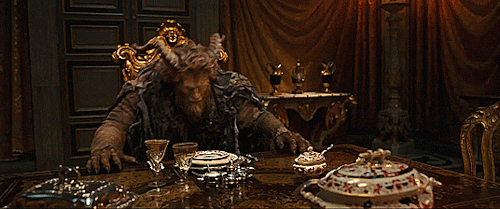
But yeah, returning to Rey, I guess as the main character she’s a lens which focuses the above problems. A very bitter tragedy of what her parents did t her prevents her from being comfortably comical whereas whoohooos I like thats and prancing like a husky on red bull over idols and visions because it’s for children so it must be hopeful prevents her from being intriguingly tragical. So I guess the intentioned effect was tragicomism but, from pov of an engaged casual fan that is my bro, it’s neither.
As far as Rey’s heroine’s journey lacking some of the usual elements, I blame it on Disney being... a bit too ambitious, maybe. I think they tried to make a heroine’s journey that isn’t ostentaciously seeped in traditional feminine/masculine traits, maintains the structure without what could be called accidentals. On the one hand, I would point out that hero’s journey has pretty much desexualised itself over time, we are rather accustomed to “shero’s” journeys, but on the other... maybe Disney set out on a too novel a territory and may crack their teeth on it, alongside trying to out-Vader Vader at redemption. To elucidate, “toxic femininity” in which a heroine is supposed to find herself in the beginning of her journey, in Rey’s case is uprooted from any of our usual concepts of feminine-masculine social roles (it’s space, duh). My interpretation is that Rey’s version of toxic femininity kind of exists in contrast with Kylo Ben’s version of toxic masculinity - and since the apparent focus of the story is the attitude towards the past/parent figures, toxic femininity would mean her clutching onto the past. Which is why I predict that some act of IX will find Rey inebriated with apparent success in masculine world, meaning she’ll be the one rejecting the old gods this time - and I would point out that panel in Poe comic where she shows herself more sceptical towards idolisation of past don’t mind me, I’m just expressingmy trash dreams for a proper sith lady Rey.
Then again, Rian Johnson said she already found perfect balance between Luke’s clinginess and Kylo’s rejection of the past, so... idk, maybe I’m giving DLF too much credit again.

As for the Persephone thing, I guess the rub is that this reylo reading focuses less on the traditional reading of the myth (where Demeter is the actual main character and Kore is a Princess Peach MacGuffin) and more of an interpretation of it as one of the eldest (at least in Europe) versions of story depicting a transition of a girl into a woman, making Persephone more of a protagonist.
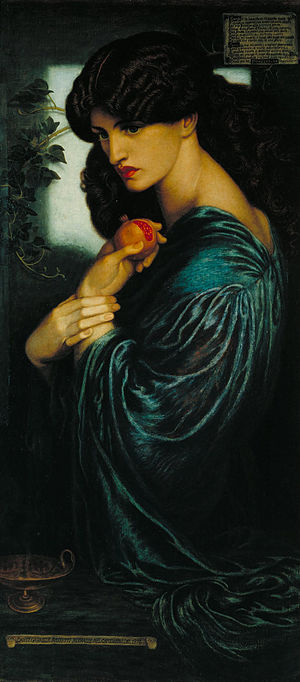
Like, y’know, this Persephone (D. G. Rosetti, source: https://en.wikipedia.org/wiki/Proserpine_(Rossetti_painting))
I’m no expert, but myths can lose their original meanings because of power relations (anyone still remember about Dionysus, the god associated with excessive drinking, going through a very Christ-like death and resurrection?) and I think it’s possible that this is the case with the story of Persephone becoming a pre-scientific explanation of seasons changing over the year. So teah, that’s how I always understood the Persephone theme regarding Rey.
But yes, I must agree that I’m confused about Disney’s handling of the mother figure, which... Look, SW became a legend of a modern myth because of how epically Lucas handled the hero dealing with his very explicit father. So yes, I don’t understand what exactly is their game with Rey Nobody from Nowhere in this regard. It’s one thing that they had a cool idea with giving her no lineage, another that parent figures are an essential element of archetypal journeys and from symbolic viewpoint the case of a female character the biological relationship is even more crucial than in male’s. And I swear to all the ewoks and porgs in the galaxy, I do hope Disney’s idea of Rey healing the mother/daughter divide isn’t through her healing the divide between Leia and Ben. Again, this isn’t the idealistic sphere. Just... no.

Anyway, I still maintain hope (this whole meta blog is built on hope) that Rey will indeed turn out to have a proper personal mistake which will make her stand out in the saga. I do have to admit, though, that I find your last theory very likely. I mean, even when I read all the reylo metas going oh, Rey is going to have such an exciting arc in IX, she has so much to deal with though of course it’s not going to compromise her morally, it will be sooo exciting, I just... f*ck’s sake, what you’re describing isn’t a dramatic character only a dramatised role model. It’s great if that’s your thing, but don’t claim it is space opera-worthy, in operas people drown themselves because of cursed sailors, kill over a break up, decapitate over a bad dream and get dragged to hell over a dinner, not persuade their fallen lovers to change their ways, let alone patienly wait for them the understand the error of their ways (and if they do it’s doomed to end in someone dying).
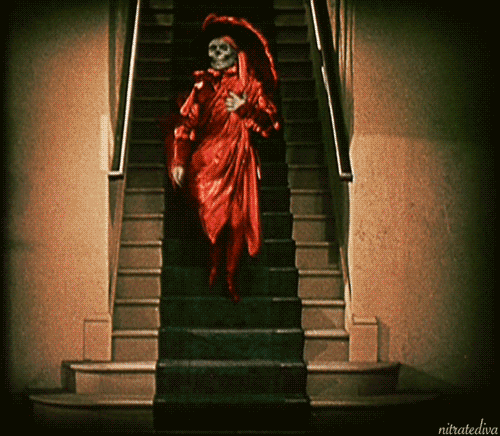
#asks#sw negativity#just because i love doesn't mean i can't be critical#heroine's journey#long asks anon
43 notes
·
View notes